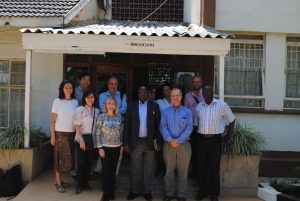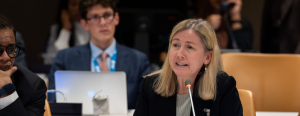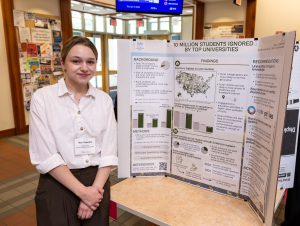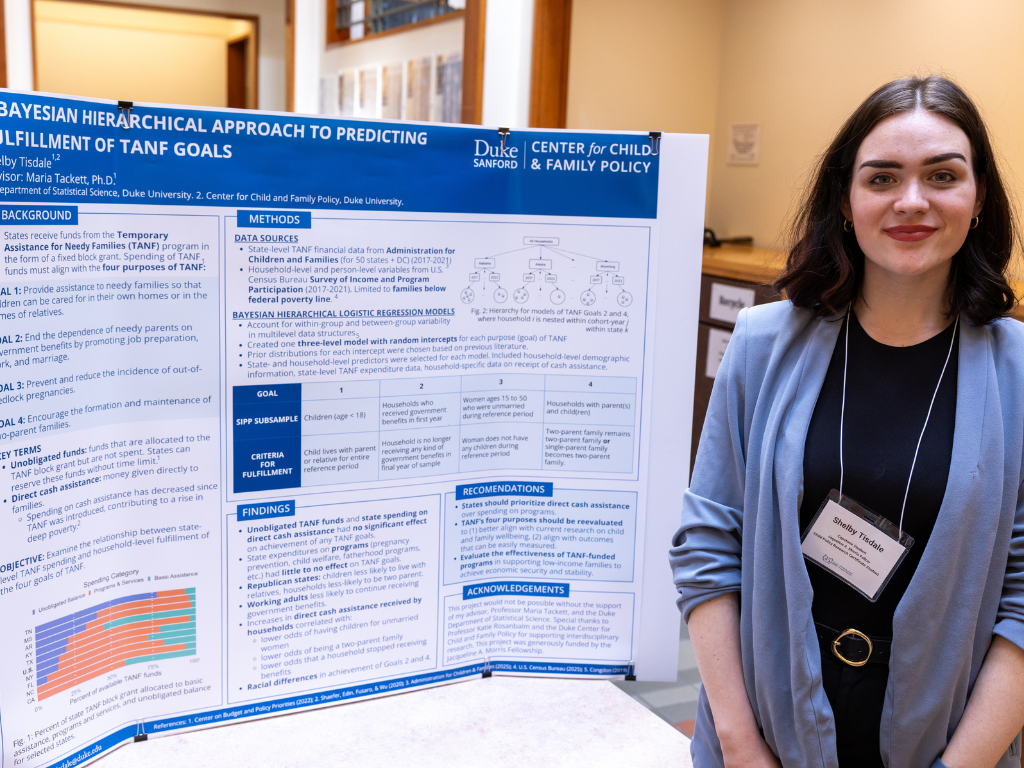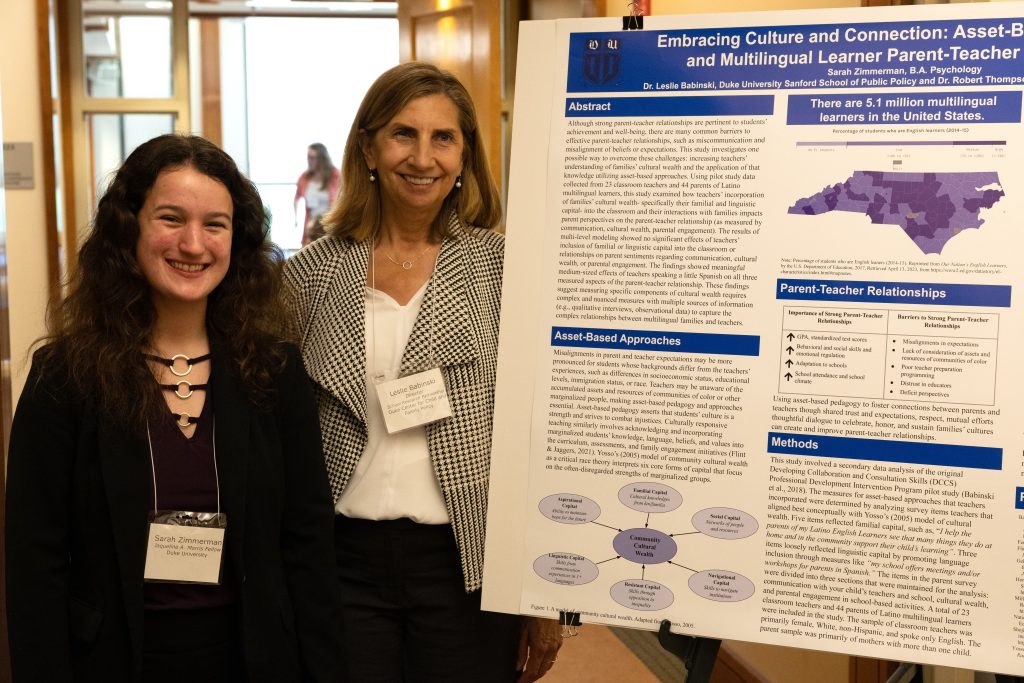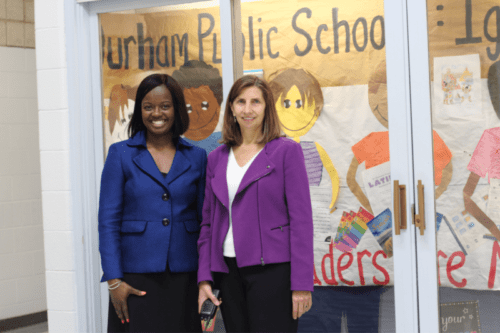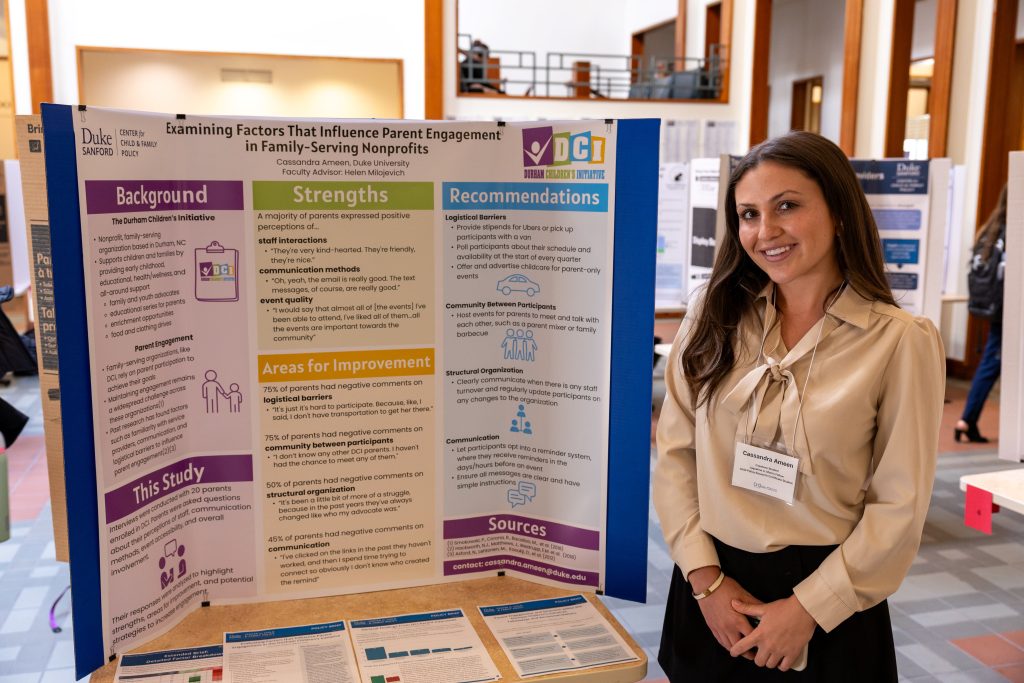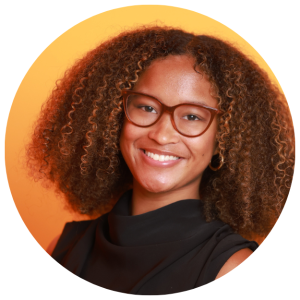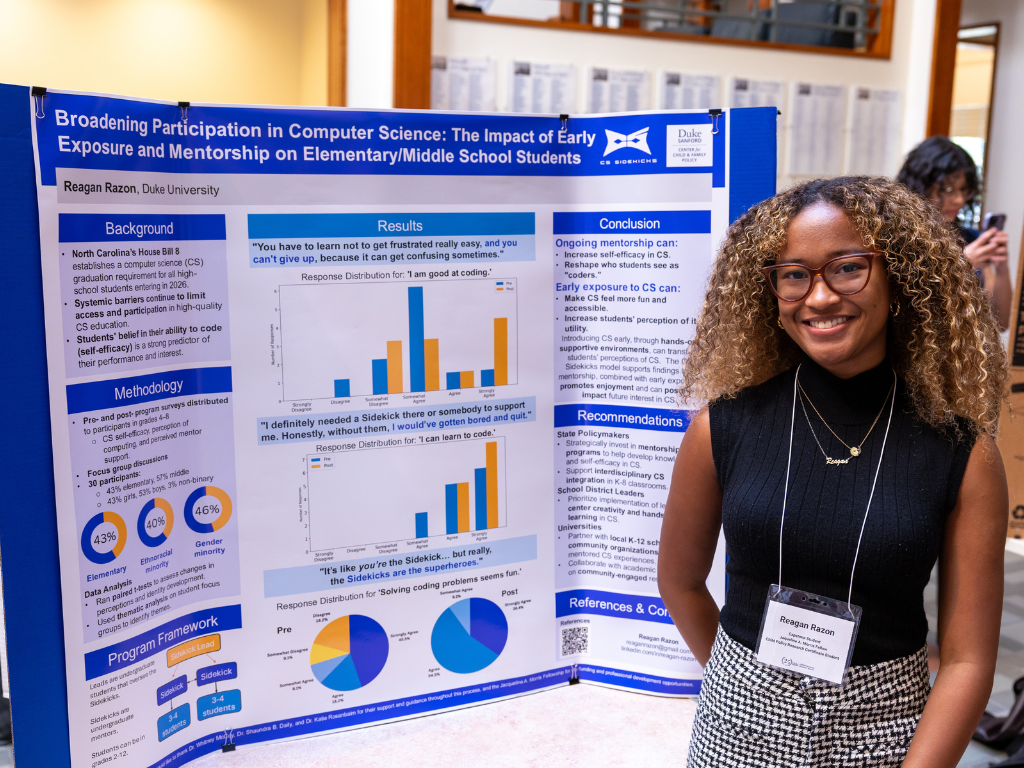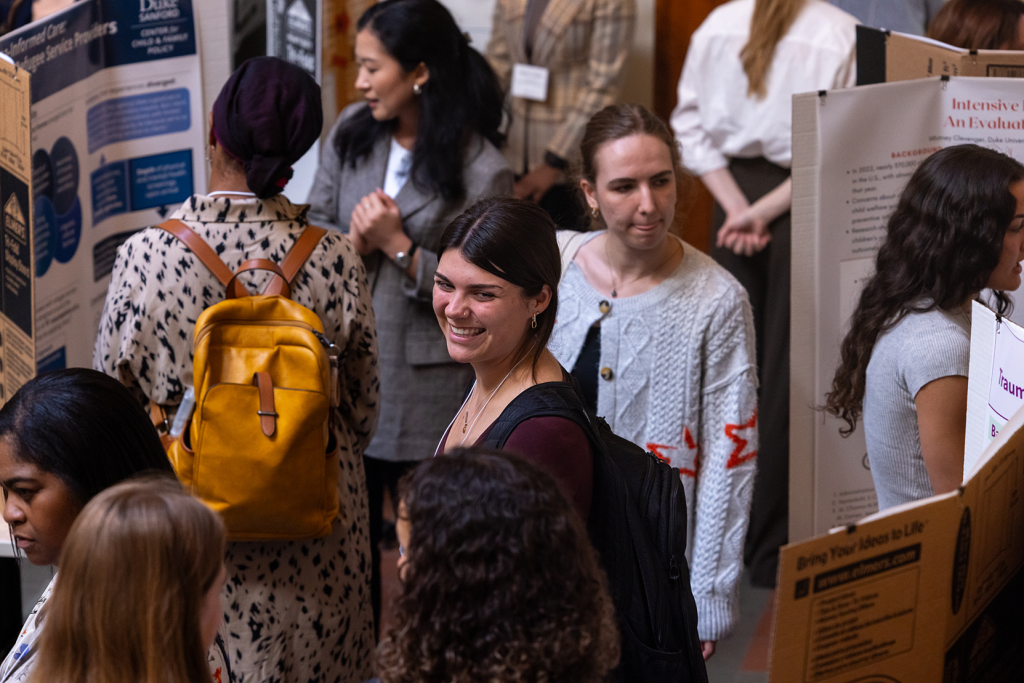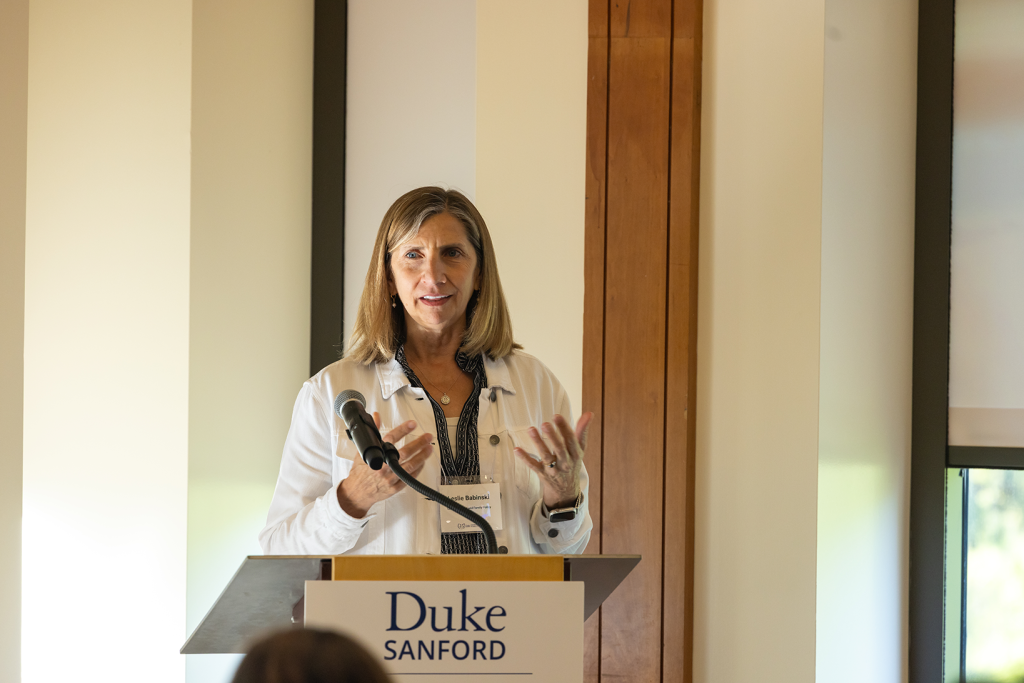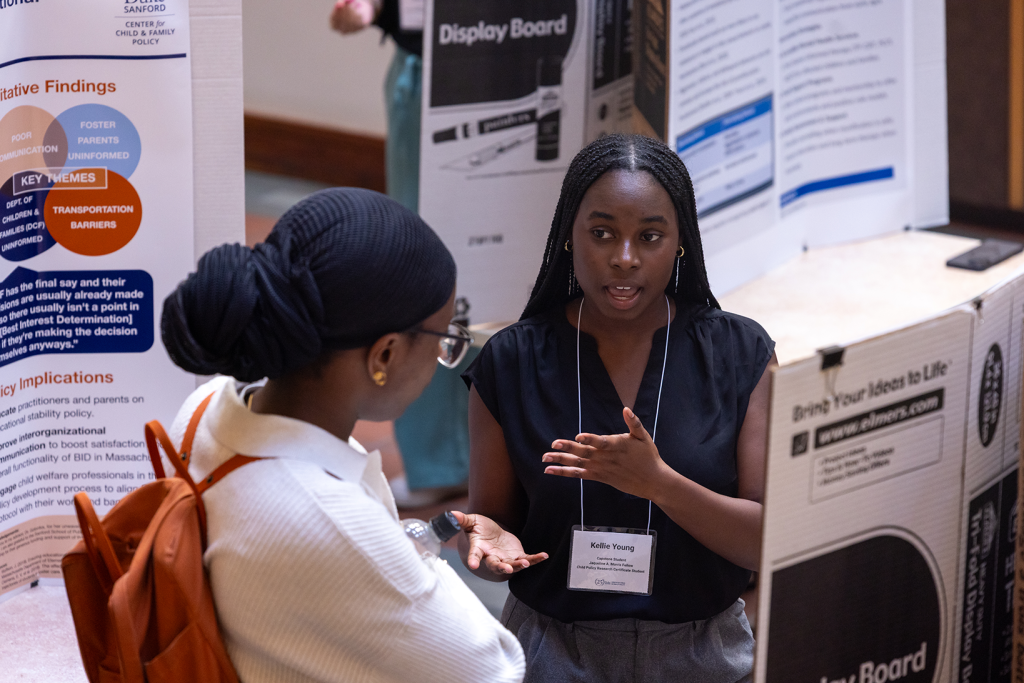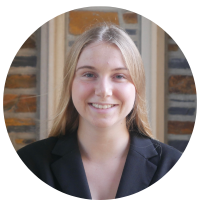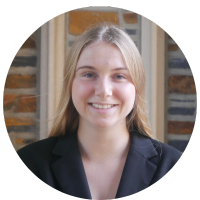As part of the Center for Child and Family Policy's 25th Anniversary celebration, we are honoring faculty, researchers, and staff who have contributed to the Center's work, culture, and impact.
Jennifer Lansford serves as the Director of the Center for Child and Family Policy. Read on to learn more about how she got involved with CCFP, the travels her research has taken her on, and the eclectic book club she is part of.
_____________________________________
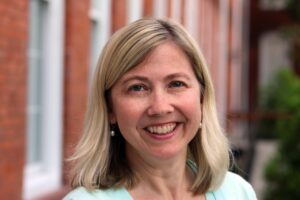
Jenn Lansford
You've been with the Center since you were a post-doc at Duke. How did you initially connect with CCFP?
I had been an undergraduate at Duke, and when I was in my final year of graduate school at the University of Michigan looking into postdoctoral opportunities, I was excited about the possibility of working with Ken Dodge at CCFP, which he had just recently launched. I was especially drawn to the chance to work in a place that prioritized applying research findings to improve the well-being of children and families.
After completing your postdoctoral fellowship, you stayed with CCFP. What were some of the early projects you worked on at the Center?
When I first started at the Center, I worked primarily on the Child Development Project, a longitudinal study of children’s development that began in 1987 with recruitment of kindergarteners in Nashville and Knoxville, TN and Bloomington, IN. Those original children were followed to age 34, making it possible to understand how a wide range of experiences during childhood and adolescence are related to social relationships, mental health, problematic and adaptive behaviors, employment, and more into adulthood.
Early on in your career you launched the Parenting Across Cultures (PAC) longitudinal study which is now in its 17th year. How did you get the idea for this project?
When I was an undergraduate at Duke, I majored in both psychology and cultural anthropology, so my interest in culture goes back many years. When we launched Parenting Across Cultures, there were several media reports of immigrant parents in a number of countries around the world engaging in parenting practices that were accepted in their home country but were considered problematic or even illegal in their country of destination. For example, all forms of corporal punishment, including spanking, have been against the law in Sweden since 1979, and there were reports of American immigrant parents in Sweden being approached by their children’s teachers to discuss this problematic behavior if they were spanking. These reports sparked my interest in better understanding how cultural contexts shape parenting behaviors and child development, including whether the ways in which parenting affects child development may vary depending on norms in different cultural groups.
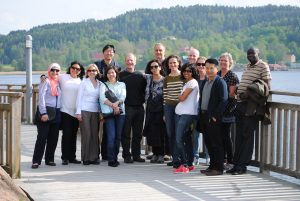
In many ways, parenting and child development are similar across cultures, even cultures that differ in important ways. For example, even in cultural groups that emphasize interconnectedness, when children move into adolescence, they make increasing bids for autonomy from their parents, and parents decrease in their assertion of control over time. We do also find interesting cultural differences. For example, when parents have expectations or behave in ways that are widely accepted within a cultural group, these expectations and behaviors are related to more positive child outcomes than when parents have expectations or behave in ways that are not widely accepted by their cultural group. Last year, Ella Davis, a Duke undergraduate, interviewed me about the PAC study if you’d like to read more.
The PAC project has taken you on many adventures around the globe. Please share a memorable story from your PAC travels.
Some of my favorite memories from PAC travels are from visits we have been able to make to the homes of some of the families who have participated in PAC for many years. Families in Kenya and the Philippines were particularly welcoming to our research team, and having the opportunity to talk with these families in their homes was a meaningful way to understand first-hand many of the cultural differences and similarities we study.
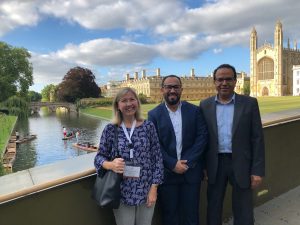
In addition to PAC, you’ve worked on a number of other projects. What’s one way you’ve seen your research impact policy at a local, state, or federal level?
Last summer, several of us at the Center worked on a series of reports focused on four “megatrends” identified by the United Nations related to families and (1) climate change, (2) technology, (3) demographic shifts, and (4) urbanization and migration. Each of these reports focused not only on how each megatrend is affecting families, but also made policy recommendations to support families in each of these areas. We had the chance to present key findings from these reports last fall to a global audience from ministries of health, ministries of education, and other government agencies focused on families, as well as at the United Nations this spring.
If you had to choose just one, what is a takeaway from your research that you would want to share?
I would want to stress to parents and other caregivers the importance of working to make children feel loved and accepted. Feeling loved and accepted by their parents is one of the best predictors of children’s mental health, behavioral adjustment, and future positive social relationships.
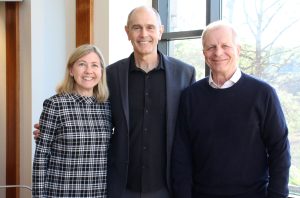
I have especially enjoyed working with different teams in the Center beyond my own research groups. It has been great fun to work with the administrative team on planning and executing special events, including our signature events like talks in the Sulzberger Distinguished Lecture Series, as well as trying new ideas, like the screening of the documentary film Inheritance. I’ve also really enjoyed having the opportunity to strategize with our Center researchers about our vision for the next twenty-five years.
What’s something people might not know about you?
My husband and I became empty nesters this year. It’s quiet at home now with just our dog and two cats. Our daughter graduated from college in May, and our son just finished his first year of college.
How do you enjoy spending your free time?
I love to read and am part of a book club that has pretty eclectic tastes. We read fiction of every variety as well as non-fiction. I just finished reading Playground by Richard Powers and will start Code Name Hélène by Ariel Lawhon next.
What is your favorite children’s book and why?
It’s hard to pick just one! I might go with Knuffle Bunny by Mo Willems, both for the funny, relatable story and the wonderful combination of photos with illustrations.
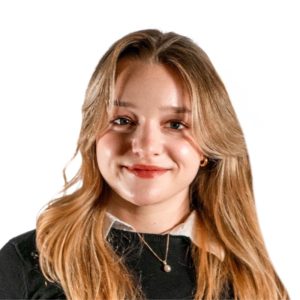
After reflecting on my passion for education and love for working with children, I made a major career shift away from medicine and applied for the Child Policy Research certificate program at Sanford.
Coming from a rural, first-generation background, I knew little about public policy, but my certificate courses were fundamentally equitable and supportive of all learners. I was met with overwhelming kindness and encouragement from the professors and directors, especially Drs. Megan Golonka and Katie Rosanbalm. Sanford was where I discovered my superpowers— wielding policy and advocacy to shape a better society for every child and the families that support them.
Can you describe your thesis project? What else has been your focus while at CCFP/Sanford?
For my capstone research project in the Child Policy Certificate, I examined the under-enrollment of rural students at elite universities— as a rural student at Duke myself! My mixed-methods approach involved identifying trends in resource and education disparities across rural America, integrated with analysis of higher education policy and practice. My project proposes practical, cost-effective strategies for achieving a proportionally-appropriate enrollment of rural students at top universities, beginning with state-level K-12 education policy and continuing into higher education administration.
Beyond this project, I am an advocate of equity-centered reform in education, from early childhood to postsecondary spaces. I am deeply inspired by children and work with students at any given opportunity, which further motivates my aspirations and deepens my understanding of education pedagogy.
At Duke, I have enjoyed working with Durham Public Schools in service learning classes, and teaching English to migrant students in South Korea with Duke Engage.
Which professor(s) had the most impact on your journey here? Why?
Firstly, I owe so much credit to Dr. Molly Goldwasser, who supervised my research. When I informed Dr. Goldwasser of my decision to pivot to education policy, she responded simply with, “correct!” I recognized her as my first true mentor at Duke after spending last summer in meetings with her, mostly discussing my research— but sometimes just eating ice cream and talking about life. Beyond her guidance on my project, Dr. Goldwasser’s continued support gave me the courage to make a transformative decision for myself, and embark on my future with confidence.
Dr. Katie Rosanbalm is a rockstar and has prepared me for whatever I may achieve in the future! She teaches with so much care and passion. Despite me coming into the certificate late, her classes quickly filled the gaps in my knowledge and fostered great curiosity, exploration and growth. I honestly don’t know how she manages to balance all the good she does for Duke and the world beyond, but I know I want to be like her someday.
Where do you hope to go next?
Ultimately, I want to continue my research in education policy and utilize it to advocate for positive change. I would like to earn my PhD, but for now, I want to gain frontline experience so I can conduct future research from a more informed perspective. I am currently considering instructional and administrative positions in K-12 and higher education, and will pursue this work for a few years before returning to academia.
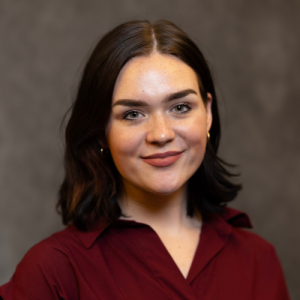
Shelby's thesis used Bayesian hierarchical modeling to explore the relationship between unobligated Temporary Assistance for Needy Families (TANF) state welfare funds and fulfillment of TANF policy goals at the household level.
In May 2025, Shelby graduated from Duke with a B.S. in Statistical Science, a minor in Education, and a certificate in Child Policy Research.
Read on to learn more about Shelby, her experience working with the Center, and what she plans to do next.
Q&A with Shelby Tisdale
What brought you to Duke?
I am originally from a small town in Mississippi and didn't have much exposure to prestigious universities when I was growing up. When I was in middle school, a teacher encouraged me to consider attending an elite out-of-state college because I would receive generous financial aid. I toured Duke when I was in high school, and I almost instantly knew I wanted to come here. I did not want to feel that I was restricted to taking courses in a single discipline, and I was excited about the opportunities for interdisciplinary study at Duke.
What made you interested in connecting with the Center for Child and Family Policy as a student?
I believe that most of the problems in our society are best addressed by investing in people when they are children, and because of this, I decided to pursue the Child Policy Research Certificate before I even decided on my major. I knew that whichever discipline I studied in college, I wanted to do work that helped provide more opportunities for children to thrive. When I saw a job opening at CCFP during my freshman year, I applied quickly, knowing it would give me greater exposure to fascinating work being done in child and family policy.
What is a favorite project or memory from your time working with the Center?
My junior year of college, Professors of Sociology Kathryn Edin and Timothy Nelson from Princeton University visited to give the Sulzberger Distinguished Lecture at CCFP , where they spoke about their new book, The Inequality of Place. I was given the opportunity to assist in preparation for Profs. Edin and Nelson's visit and to have lunch with them before the lecture. Our conversation over lunch inspired my senior thesis and heavily motivated my decision to pursue a PhD in Sociology, though I had never taken a course in sociology.
How has the Center for Child and Family Policy impacted your experience at Duke?
CCFP has truly been a home for me during my time at Duke. Many of my favorite courses were within the Child Policy Research Certificate Program, especially the cornerstone and capstone courses. Through the certificate program and the Morris Fellowship, I have met students with diverse disciplinary backgrounds who are united by a common passion for contributing to research that tackles challenges faced by children and families. I originally found the process for conducting interdisciplinary research to be intimidating, but the support I received through CCFP made it easy for me to develop a project that functioned as both my honors thesis in Statistical Science and my Child Policy Research Independent Study. The faculty and staff at CCFP have shown me nothing but kindness and support, and I've had countless opportunities to engage with leading scholars who are making a positive impact in various fields such as policy, education, sociology, and child and family health.
What are your plans following graduation?
After I graduate, I will be pursuing my PhD in Sociology at Princeton University.
What do you see yourself doing 10 years from now?
I hope to become a professor of sociology after I obtain my PhD. Right now, I am generally interested in studying education, poverty, and intergenerational social mobility, but I expect my interests to evolve as I begin my PhD. I would love to teach courses on quantitative research methods. I would love to come back and live in North Carolina again one day.
What do you like to do in your spare time?
I spend most of my time outside of school either in the gym lifting weights or at my church in Durham. I love reading and writing poetry and drawing portraits.
What's something that most people at CCFP probably don't know about you?
As of May, I am a licensed high school math teacher.
By Berkeley Yorkery, CCFP Scientific Manager
Dr. Sarah Komisarow, Assistant Professor in the Sanford School of Public Policy and Affiliate in the Center for Child and Family Policy, and Steven W. Hemelt, Professor of Public Policy at the University of North Carolina at Chapel Hill (UNC-CH), recently welcomed approximately 50 students, faculty, researchers, and practitioners to campus for the Triangle Economics of Education Workshop (TEEW). The daylong workshop brought together scholars to present and discuss empirical research on the economics of education. This year, TEEW presentations focused primarily on post-secondary education.
The keynote speaker Celeste Carruthers, the William F. Fox Distinguished Professor of Labor Economics in the Haslam College of Business at the University of Tennessee, spoke on the evolution of policy goals for postsecondary education and training. Her talk, “Education & Workforce Alignment: A Conversation Between Policy and Research,” began by looking at what drove states to set “moonshot” postsecondary attainment goals about 15 years ago and state policies adopted to support those goals. Dr. Carruthers presented research on the implementation of free community college in Tennessee (Tennessee Promise) and the significant impact the program had on postsecondary enrollment, Associate’s degree attainment, and increase in earnings during the early years of implementation. Given her own and other research on similar programs, Dr. Carruthers finds that free college programs are generally effective, particularly if the criteria for participation are not too restrictive.

Dr. Carruthers then turned to the widespread post-pandemic discussion about the value of college education. She highlighted a wide body of research showing the life-course rate of return on college is a good investment for those who complete bachelor’s and associate’s degrees. However, for the significant number of students who start but do not complete college, are less likely to see a financial return.
These findings, popular perceptions about the value of college, and political shifts have all contributed to the more recent increased emphasis on “credentials of value” rather than college attainment. She highlighted that, similar to the period of time when “moonshot” goals were set, this new focus is fueled by a demand for alignment with workforce needs and informed by research on the returns to postsecondary education, technical education, and specific credentials. Many state policymakers are now thinking more critically about the value of various degree and credential programs focusing on the rate of return for specific types of degrees and workforce demands. They are then adjusting state policies targeting the attainment of degrees/credentials that show higher rates of return for students. She pointed to Florida, Tennessee and Texas as states that are moving quickly to try and align postsecondary education and workforce needs.
Dr. Carruthers ended with a call to education researchers on the need for new methodologies that adapt to this emphasis on high-value credentials. Dr. Carruthers her peers to engage in policy-relevant research in this area so they can contribute to the design and evaluation of policies that build and adapt to evolving education-to-workforce policy goals.
Additional topics included at this years’ TEEW included presentations on:
- the impact of new community college openings on enrollment and degree completion
- a novel approach to estimating supply and demand at the undergraduate program level at UNC-CH,
- college student outcomes during Covid-19; and other topics.
(Abstracts available online at https://childandfamilypolicy.duke.edu/wp-content/uploads/2025/05/TEEW2025_Abstracts.pdf)
Throughout the day, presenters shared their research questions, methodology, and findings while attendees ask thoughtful questions and engaged in enthusiastic discussions about the strengths and challenges of study methodologies and possible next directions for research.
As part of the Center for Child and Family Policy's 25th Anniversary celebration, we are honoring faculty, researchers, and staff who have contributed to the Center's work, culture, and impact.
Leslie Babinski is a research professor in the Sanford School of Public Policy and an affiliate of the Center for Child and Family Policy, as well as the director of the Duke School Research Partnership. Read on to learn more about her research at the Center, why she loves the CCFP Community, and her favorite children's books.
__________________________
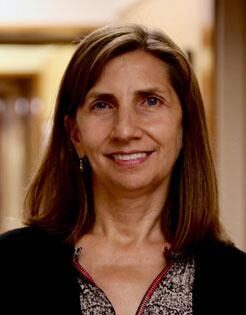
I started working at CCFP in September of 2008 – almost 18 years ago! Beth Gifford hired me to work on an evaluation project for America’s Promise Alliance. It was a short-term project, so I knew I’d have to find other opportunities if I wanted to stay at Duke.
Can you share a bit about your early work at CCFP?
I started as a Research Analyst after having been an associate professor at Bucknell University and an associate research director at a non-profit. My job at CCFP was to interview the executive directors of non-profit organizations to ask about America’s Promise Alliance. These were in-person interviews – so I made many trips to DC. One of the perks of the job was to talk with lots of really interesting and accomplished leaders.
You serve as the director of the School Research Partnership for the University. Can you describe the purpose of the School Research Partnership (SRP) and share why you believe it’s important?
The goal of the SRP is to help Duke researchers connect with public schools. We host an annual event in which school district research directors talk about applying to conduct research in the schools and their priorities for research projects. We try to help researchers think about district leaders as partners in the research process. We also host an annual spring event that highlights the applied research of our students and features a presentation by researcher/policy/practice team.
You stepped up as Director of CCFP in 2019 and then led the Center through the Covid years. What was one of your takeaways from that experience? Covid was a tough time for everybody.
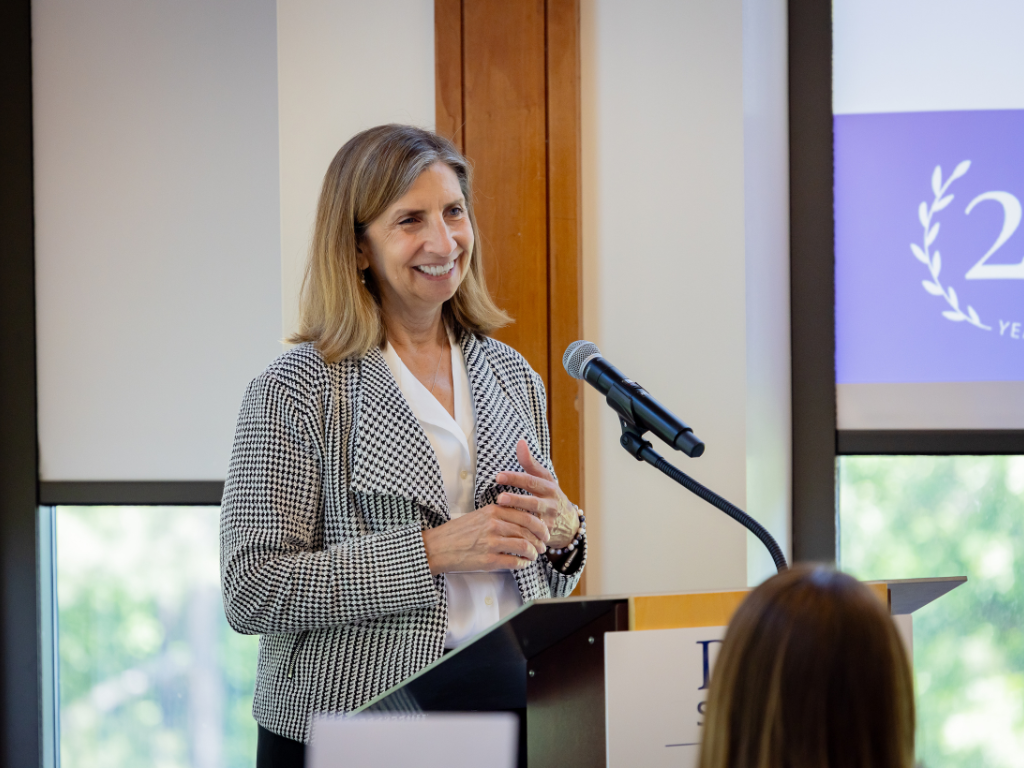
Much of your recent work has been on the BELLA project. Can you share how that work began, what your team has learned, and what’s next for BELLA PD?
We’ve had terrific success with the BELLA Professional Learning Program. BELLA shows positive outcomes for both teachers’ practices and students’ language and literacy growth. Thanks to the amazing BELLA team, and our school partners, we’ve been able to design and evaluate a program to bring together grade-level and English-as-a-Second Language teachers to accelerate language and literacy growth for their multilingual learners. I’ve also started a company (figstar.org) to build a new version of the program and focus on dissemination and scaling.
If you had to choose just one, what is a takeaway from your research that you would want to share?
All children can thrive in a high-quality educational environment.
What’s one of your favorite stories or memories from your years at CCFP?
I always enjoy Erika’s creative Halloween costumes! I hope she’ll come back this year.
What is your favorite children’s book and why?
I have very fond memories of reading to my kids every night – the classics were some of our favorites – The Very Hungry Caterpillar, Goodnight Moon. The first book I remember reading on my own was Heidi – it’s when I realized that you could learn about new places and people in books – very exciting!
What’s something people might not know about you?
I am an aspiring pickleball player – just need to find the time to learn!
What’s one of your favorite local restaurants and do you have a go to order?
Carrboritos in Carrboro for the tostada.
What is your favorite genre of music, tv, books and/or film? What are you currently listening to, reading, or watching?
I’ve been listening to Taylor Swift lately – enjoying having my daughter living at home for the past six months. I enjoy reading anything by Ann Patchett – I am reading Tom Lake now. I listened to the Dutch House audio book read by Tom Hanks – one of my favorites!
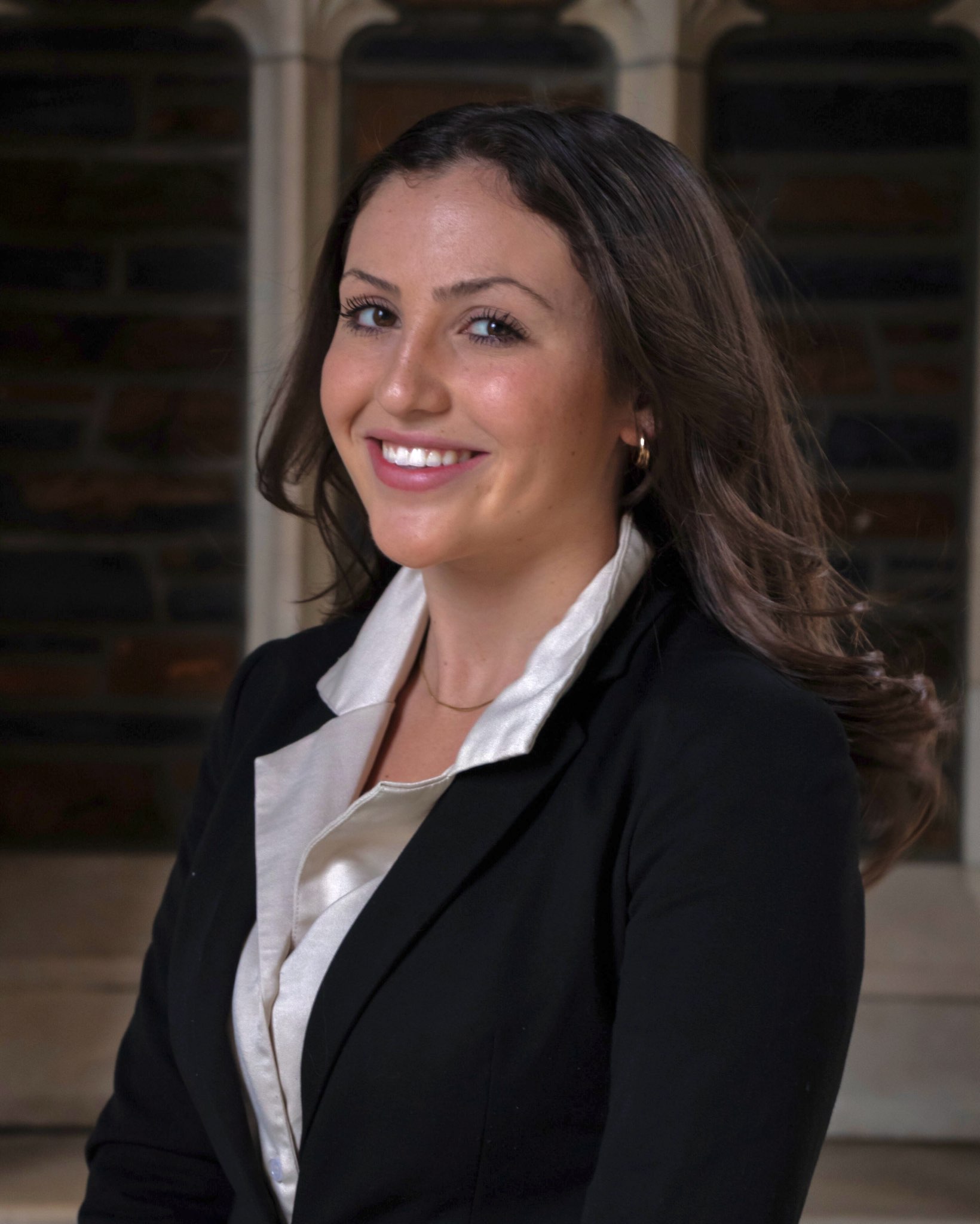
Cassie's independent research project focuses on the role of parent engagement in local family-serving nonprofits.
Read on to learn about Cassie, her research experiences and journey at Duke, and what she plans to do next.
Q&A with Cassie Ameen
What brought you to Sanford / Center for Child and Family Policy?
In high school, I completed a research project comparing the quality of public schools in high-income and low-income areas. This project was a light bulb moment for me; it was the first time I truly realized how significantly a child’s environment can impact their life trajectory. From that point on, I knew that I wanted to study how public policy could improve children’s environments, and in turn, improve their life outcomes.
When deciding which colleges to apply to, Duke’s public policy program immediately stood out. Sanford offered the education, resources, and opportunities I was looking for, and the Center for Child and Family Policy aligned perfectly with my interests.
I spent my first year at Duke exploring a variety of classes and fell in love with Sanford’s offerings. Although I was still not sure if I wanted to follow a traditional pre-law route or explore research in child policy.
The summer after my freshman year, I interned at a criminal defense firm in Portland, Maine. This experience deepened my understanding of how poor environments and early adversity, especially childhood trauma, can lead individuals to unfavorable life outcomes.
My sophomore year, I returned to campus even more committed to studying policies that could positively change the trajectory of children's lives. I joined a research team at Duke’s Law School focused on trauma-informed judicial practices in North Carolina’s juvenile justice system, and I taught an after school class on social-emotional skills at a local elementary school.
What professor had the most impact on your journey here? Why?
The summer following my sophomore year, I was still conflicted about how I might want to approach issues in child and family policy. I was not sure if I wanted to go to law school, take on a political position/internship, or start a career in research. However, things quickly began to take shape when I reached out to Dr. Katie Rosanbalm.
Dr. Rosanbalm took the time to share about her research projects that support children and families in North Carolina. During that conversation, I felt I had found someone with the same interests and motivations as myself -- someone who saw the world the way I did, and someone who had dedicated their career to the issues I care about. I was inspired.
During my junior and senior years, Dr. Rosanbalm regularly mentored me, and I worked for her team as a research assistant. I supported her projects to implement trauma-informed policies in schools and childcare centers. Duke’s Center for Child and Family Policy quickly became my home, and it always will be. I love the people there, I love the work that they do, and I feel a true sense of belonging when I step into the office.
Can you describe your research experiences while at Duke?
During these last two years, I let my curiosity and passions guide me into a variety of positions. I continued my research to support the implementation of trauma-informed juvenile justice practices in North Carolina Courts and continued teaching the after-school class on social-emotional skills. I interned at the Hunt Institute, an organization dedicated to improving public education. I interned at Citizens for Juvenile Justice in Boston and wrote a report on the unintended consequences of mandated reporting for child neglect. I joined a research team to examine the academic experiences of youth in foster care. Lastly, I worked with a local nonprofit, the Durham Children’s Initiative, to complete my thesis on strategies for increasing parent engagement.
Where do you hope to go next?
Next year, I will attend Harvard Law School, where I hope to learn how I can use the law to effectively advocate for children and families. My experiences at Sanford at the Center for Child and Family Policy have taught me so much, and I hope to bring all of these lessons into my legal career.
Reagan Razon has long been interested in the intersections of computer science, education and policy. As a computer science major studying child policy research, Reagan found her perfect fit course when she enrolled in Equity in STEM Education (EGR190S/EDUC290S) her junior year.
In taking this course, led by Dr. Whitney McCoy, Reagan became involved with the InventHERS Institute, a program that provides mentorship and hands-on engineering experiences for young girls and their caregivers from local underserved communities. Dr. McCoy, creator and founder of InventHERS, invited students enrolled in Equity in STEM Education to participate in the Institute’s weekend sessions to serve as mentors to local third through fifth grade girls.
The following summer, Reagan was invited by Dr. McCoy to participate in research using data collected during the Institute. She has continued to work with Dr. McCoy -- as part of the L.I.F.T. LAB at Duke -- on other endeavors related to engineering education and outreach in the Durham community as they directly relate to her thesis project.
Read on to learn more about Reagan, her research, and what she plans to do next.
Q&A with Reagan Razon
Responses have been edited for clarity.
What is your thesis about?
My project looks at how informal programs increase students' confidence and self-efficacy in elementary and middle school grades. More specifically, the purpose of my research is to investigate student outcomes associated with informal, mentorship-based, computer science (CS) programs, focusing on the relationships between self-efficacy, STEM identity, and utility among students in grades 4-8.
What inspired this project?
Currently, I am president of a group called CS Sidekicks, which is a group that was started by Duke students around four years ago, with the goal of empowering a future generation of computer scientists specifically in Durham. We teach CS to students in Durham Public Schools for free twice a week after school. This is a very informal computer science program that centers on mentorship. I've always been interested to learn what impact programs like this have on students' confidence, perceptions of CS, and perceptions of themselves. Specifically, I looked at the constructs of self efficacy - their belief in their ability to do CS - and their belief in the utility of CS. Do we think it’s useful? And then this new concept called equity ethic, which is the idea that marginalized students have a motivation to use CS to help the community for good. This is seen when students want to use CS to build tools for the community. I was interested in seeing how these different constructs occur in elementary and early middle school students because a lot of this research is done on high school students and undergraduates.
The main impetus for this project, however, was House Bill 8 that passed two years ago and mandates a CS graduation requirement for high school students in North Carolina by 2026. A lot of activists have been pushing for these policies across the United States. However, when I'm looking at this policy I think, "What about the students who will drop out of CS or what if the CS classes will push them out?" That will lead to attrition and to lower graduation rates for specific demographic groups.
A lot of activists have been pushing for these policies across the United States. However, when I'm looking at this policy I think, "What about the students who will drop out of computer science or what if the computer science classes will push them out?"
So, my whole idea for this project is that the existence of programs like CS Sidekicks at an early age can help students enter high school already feeling confident about CS, and thus, able to pass the courses and graduate. We know that just mandating something does not mean gaps will necessarily close.
What professor(s) had the most impact on your journey here? Why?
Integral to my [Child Policy Research] capstone course and CS thesis were Dr. Katie Rosanbalm and Dr. Whitney McCoy.
They both bring an evident passion to their work, whether they’re teaching classes or working on their interventions.
That's what I've loved about being in the Child Policy Research Certificate program is that all of the professors that I've had in the program have been very caring with students, sharing resources and being transparent about what it’s like to do their job. This is not always present in other disciplines.
Dr. Rosanbalm takes the time to give very specific feedback on your work. This is something that's very valuable but time consuming, and I admire that because it helps you find very targeted things to improve upon. That’s something I want to take with me if I do go into teaching. It shows students that professors really do care about your success and growth.
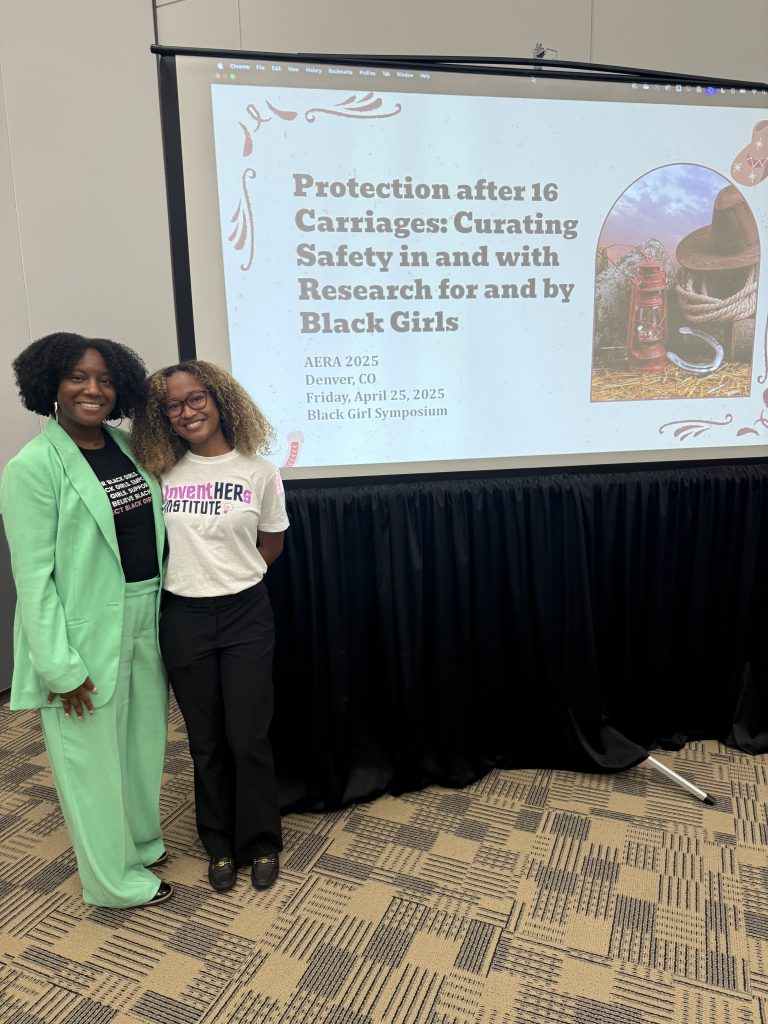
Dr. Whitney McCoy and Reagan Razon at AERA 2025 Annual Meeting.
With Dr. McCoy, I admire her passion for her research interests in equity in research education. Just seeing how she build the InventHERS Institute and where it is now just two years later is incredible. I was grateful to work with her last summer and attend the annual American Educational Research Association (AERA) conference with her recently. I got to witness the larger research community get excited about her work with InventHERS. It was exciting to see that you can be doing something in Durham, North Carolina and people around the nation can be wanting to bring your work to where they are or build upon it.
Dr. Rosanbalm and Dr. McCoy have also encouraged me to apply for opportunities like the Morris Fellowship. Before this year, when I was thinking about the projects I wanted to do while at Duke, I didn't fully understand that I didn’t have to be a public policy major or in a certain discipline to do a thesis related to education.
I was the first CS student to get the Child Policy Research Certificate, and I wasn't sure if my work would be eligible for the Morris Fellowship. Dr. Rosanbalm and Dr. McCoy encouraged me to apply, even when I was unsure. I did, and I was awarded the fellowship. Their encouragement helped me see that if you say no to yourself first then obviously you won't get it. But if you put yourself out there, there’s a possibility that you can. I am grateful that I’ve been able to shift my mindset and put myself out there.
Where do you hope to go next?
I'm currently an intern at the North Carolina Department of Public Instruction. Being able to work in a state department has exposed me to all aspects of policy development. I've really enjoyed this internship. I've been able to work on CS education projects, as well as rural education grants and policymaking.
In the future, I'd love to do something in the same realm and continue influencing education. Being a NC native, I would hope to return to North Carolina after I pursue more training and education.
In the near future, I'll be moving to New York and doing something to build up my technical skills in CS. For me, this will be more of a building block toward my aspiration of pursuing a PhD in the realm of education or education policy and focus on STEM or K-5 education.
By Bess Pierre, PPS/Child Policy Research Certificate student '25
The 2025 Duke School Research Partnership (SRP) poster presentation and dinner this April featured 27 student presenters – the highest number of student participants to date. Hosted by the Duke Center for Child and Family Policy, celebrating its 25th anniversary, the event provided an opportunity for Jacqueline A. Morris Fellow recipients and undergraduates in the Child Policy Research Certificate Program to present their research and connect with local educators.
I was proud to be among this group of students presenting on child policy research issues, particularly due to the incredible range of topics represented across projects. This semester, I had the opportunity to learn and collaborate alongside eight other students in the Child Policy Research Capstone class, working throughout the semester to repackage our independent research into a number of deliverables, ranging from an op-ed to a policy brief. The SRP provided the opportunity to share my research, “An Evaluation of the Every Student Succeeds Act’s Educational Stability Provision for Foster Youth in Massachusetts,” with educators, advocates, and other students. I was also able to connect with students outside of my class, and I was struck by the diversity of research topics. For example, there were many projects on school-based interventions and trends, including bilingual education, engagement in computer science courses, and school discipline, as well as research that focused on other social policies such as the impact of Medicaid expansion on infant mortality, TANF spending patterns, and trauma-informed care. This diversity really highlighted that the Child Policy Research Certificate program attracts students from a variety of disciplines who all find fascinating intersections with child policy.
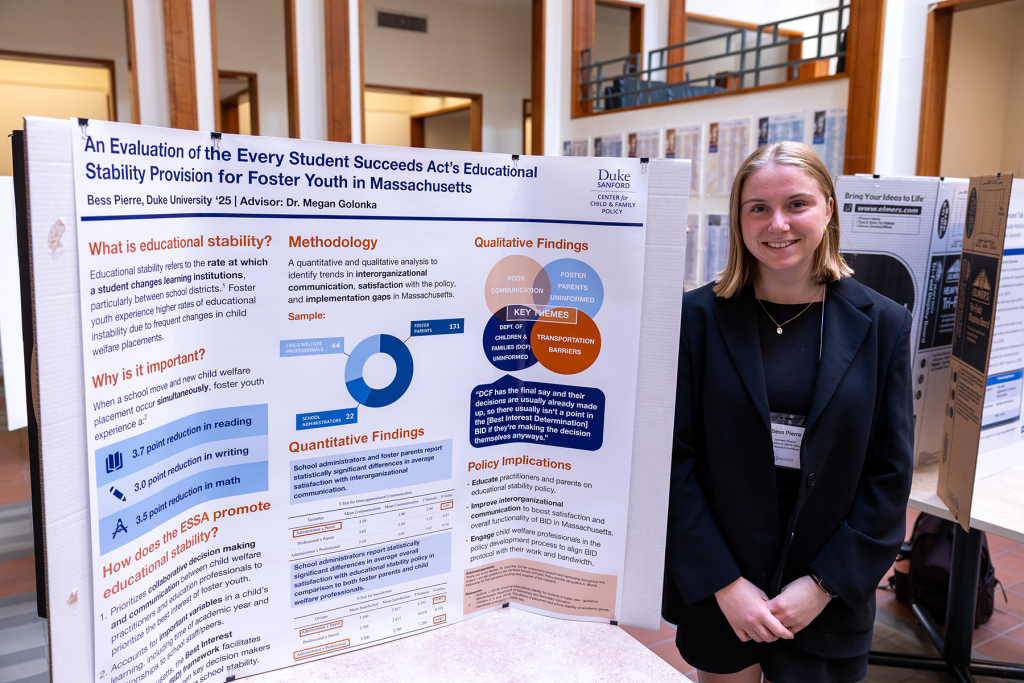
In addition to the student poster presentations, this year’s event featured a panel of speakers involved in the development, implementation and evaluation of a teacher professional development program for English as a Second Language and classroom teachers to work together to support English Learners and improve teacher and student outcomes. This research was led by Dr. Leslie Babinski, School Research Partnership Director and Research Professor at the Center for Child and Family Policy who was joined by Dr. Jennifer Mann (Research Scientist, Center for Child and Family Policy), Valeria Murray (ESL Director, Wake County Public School System), and Amanda Berry (ESL Coordinating Teacher, Wake County Public School System). The panelists described the importance of collaboration in strengthening support and long-term success for multi-lingual learners, as well as classroom teachers. The team’s research develops curricula and collaborative strategies to support the implementation of high-impact instruction that facilitates language and literacy skills for English Learners. Given that ESL coordinators are often stretched thin within schools, these interventions seek to provide direct support and training to classroom teachers as well. I was struck by the researchers’ emphasis on educator-driven practices, whereby intervention development is responsive to the experience and feedback of school personnel. The preliminary findings of the research are promising, indicating positive experiences from teachers and students alike.

The SRP puts into practice one of the core ideas of research that can fall to the wayside if not made a priority: connecting research and practice by creating a space for students, researchers, and educational professionals to have discussions about their findings and personal experiences. I left the evening feeling hopeful about the ability of researchers and practitioners to work together to improve educational practices and learning outcomes for students. My experience as a student researcher presenting my findings at the SRP exceeded expectations for what I had imagined those few years ago, when the possibility of being a student researcher at Duke was nothing more than a dream.
Bess Pierre is a senior majoring in Public Policy with a minor in German and a Child Policy Research certificate. She is interested in improving child welfare and education systems through program evaluation and evidence-based implementation.
By Bess Pierre, PPS/Child Policy Research Certificate student '25
In an event titled "The Next Generation: Contemporary Issues in Early Childhood and Emerging Directions,” the Center for Child and Family Policy welcomed Dr. Joan Lombardi, director of the Early Opportunities Initiative and adjunct professor and senior advisor at the Stanford University Center for Early Childhood, Graduate School of Education. Lombardi's talk was as a part of the Sulzberger Distinguished Lecture Series, made possible through an endowment from the Arthur Sulzberger Family.
With an overarching message of needing to advocate for all children, Lombardi identified seven core issues affecting children globally: poverty/inequality, climate, urbanization, conflict, displacement, technology, and the precarity of childcare. Of these, I was most interested by her comments on the role of technology in childrens’ lives. Lombardi emphasized that children in developed countries are using technology more frequently and at an increasingly younger age. To illustrate this phenomena, Lombardi evoked an image of a family at a restaurant with a toddler engrossed by an iPad, rather than present in the environment. This trend, in addition to being unprecedented, has the potential to interfere with essential parent-child interactions and disrupt young children’s development. Highlighting technology as a a new and unknown dimension of a child’s life, was a reminder that children’s lives are now exposed to constantly evolving technology at a rate and pace that is unprecedented.
Lombardi also elaborated on critical impact of a more obvious issue in early childhood: the shortage of child care. I was especially excited to hear Lombardi’s thoughts on this policy problem, as it is one that I have taken a special interest in at Duke. To explain the root of the issue, Lombardi described the “child care policy gap,” where between the end of parental leave and the beginning of early elementary school, families with young children are left to fend for themselves. Ultimately, in much of the world there is a lack of both public and private action to combat this gap, leaving families in a childcare landscape that is under-resourced and costly. Further, Lombardi also described how childcare centers themselves are in an undesirable position, caught between needing to raise tuition to pay teachers more while also not wanting to impose even higher costs on families.
To respond effectively to these seven core issues, Lombardi recommends a community-driven movement to provide so-called domains of nurturing care. , She advocates these domains of nurturing care be developed locally to provide responsive systems of comprehensive services that scaffold family wellbeing through a diverse range of programs. Modeled after Urie Bronfenbrenner’s bioecological theory, the various institutions and systems in a child’s community would provide resources that are responsive to the specific challenges they experience. Lombardi explained that this model is essential to tackling the core issues she outlined because there is no single solution to address the global community’s current shortcomings in early childhood. A community-driven, equity-focused approach to solutions is necessary.
While I found this recommendation to address the range of issues to be deeply optimistic in the current policy landscape, Lombardi’s current work with the RAPID Survey Project is a step toward identifying early childhood policy priorities for communities. Started in the Stanford Center on Early Childhood in 2020, the RAPID initiative collects both national and placed-based data on the experiences, wellbeing, and needs of young children and the adults who care for them. The project is unique because it provides results and recommendations in real time, allowing policy makers, institutions, and communities to respond in a timely fashion.
I walked away from Lombardi’s presentation reminded that the issues most pressing in early childhood are the same issues all of us face, regardless of age or geography. In the face of political and financial uncertainty, it is critical that individuals and institutions find ways to mobilize resources that enable us to move toward addressing these issues together in our local communities, rather than denying their existence. Lombardi and others in the child policy world are working towards this goal no matter what the future holds.

Bess Pierre is a senior majoring in Public Policy with a minor in German and a Child Policy Research certificate. She is interested in improving child welfare and education systems through program evaluation and evidence-based implementation.
In 2022, among households with at least one resident child under age 18, the typical white household had $166,000 more wealth than the typical black household. A confluence of factors contributes to the black-white racial wealth difference, including a legacy of economic hardship due to slavery, Jim Crow segregation and violence, and exclusionary education, housing, employment, and related public policies and discriminatory practices. Reparations offer restitution and redress for these enduring harms. For black children, a child-centric reparations-based policy response can work in concert with other types of economic policies, such as access to credit, home and land ownership, and social and human capital investments that can collectively improve black wealth and intergenerational economic mobility for black Americans.
This trio of research briefs, Black Reparations for Children, based on the newly released "A Framework and Policy Case for Black Reparations to Support Child Well-Being in the United States" offer a framework for children as a focus of any reparation effort.
- Making the Case for Black Reparations for Children, details how due to a variety of social, public policy and economic forces, black children are more likely than white children to experience negative outcomes throughout childhood.
- Racial Wealth Gaps are Larger among Households with Children, describes how the black-white wealth gap is widest for households with children.
- A Child-Centric Cross-Disciplinary Framework to Black Reparations, offers a cross-disciplinary conceptual framework that suggests a three-pronged child-centric reparations strategy for black children.
Taken as a collective, these briefs motivate and describe an approach to black reparations for children.
Each of these three briefs showcases an element of a longer paper; for full text and references see Gennetian, L., Gibson-Davis, C., Darity Jr, W. "A Framework and Policy Case for Black Reparations to Support Child Well-Being in the United States” in Nature Human Behavior and OSF Preprints | Black Reparations and Child Well-Being: A Framework and Policy Considerations
As part of the Center for Child and Family Policy's 25th Anniversary celebration, we are honoring faculty, researchers, and staff who have contributed to the Center's work, culture, and impact.
Beth Gifford is a research professor in the Sanford School of Public Policy and a core faculty member of the Center for Child and Family Policy. Read on to learn more about her research at the Center, why she loves the CCFP Community, and her family's favorite local restaurant
_____________________________

I started in 2004. I remember choosing this job because of the vibrant community within the Center for Child and Family Policy and how enthusiastic and excited people seemed to be about their work. I was attracted to the composition of the CCFP team, which was not just limited to the research community, but also included folks doing policy and community engagement.
Can you briefly describe your role at CCFP?
As a research professor, my primary role is to conduct research. CCFP has felt like a home to do service-driven work that is relevant to addressing needs now. For example, from 2015-2018, I directed the Durham Children’s Data Center which brought together leaders from our county, our schools, social services, and early childhood services to engage in the co-creation of data-driven projects that could inform decision making. By co-designing research studies with community partners, I engage in a variety of projects that use data to shed light on opportunities for improvement and to evaluate progress toward goals.
Can you share a little about one of the first projects you worked on at CCFP (we’ve heard rumors of a data linkage project that was a huge undertaking)?
An early and BIG project for me was leading the evaluation of the Child and Family Support Teams Initiative. This initiative placed 100 nurse-social worker teams into 100 schools in 21 counties with the goals of improving academic success and preventing out-of-home placements.

My PhD is in health policy so when the opportunity have a leadership role in the Children’s Health and Discovery Initiative was offered I was so excited. CHDI began from an investment from the Duke Department of Pediatrics which then was boosted by Translating Duke Health. CHDI was a mechanism to bring physician scientists, clinical scholars and researchers together from across Duke University Health System and Campus. It was multidisciplinary in nature with pillars for Genes and Biology, Social and Economic Factors, Environment, Health Behaviors and Data Science. Although the focus has now shifted, the existence has helped many researchers across campus meet and collaborate. I have an ongoing collaboration with Dr. Lindsay Terrell in pediatrics as we work to develop opportunities to improve services for children and families—especially those here in Durham.
One thing many people may not know is that you split your time at Duke between CCFP and the VA. What is the focus of your work at the VA?
I work in the Durham Cooperative Studies Epidemiology Center in the Durham Veteran’s Affairs office (Durham VA). This is a service-directed center which means that the research we conduct is in response to VA and congressional requests on Veteran Health. Most of my work in this setting has been on the health of veterans of the 1990-91 Persian Gulf War. In this work, I’ve begun to partner with colleagues here at Duke who study aging, at both demographic and biological levels. I’ve found the research, the colleagues, and the interaction with veterans through the public science meetings to be very rewarding.
What’s one way you’ve seen your CCFP research impact policy at a local, state, or federal level (or, one way you hope to see it impact policy)?
Recently, I worked with the North Carolina Department of Health and Human Services on the North Carolina Early Childhood Action Plan. I have enjoyed hearing communities talk about their efforts and local action plans and efforts to support young children.

Based on my collaborative work with practitioners who serve children and families, there are a lot of low cost, currently available opportunities to improve the care children and families receive. I believe that researchers can have a role in giving service providers an opportunity to reflect on barriers and opportunities and translate their collective voice to share with policy makers and leaders who may be able to change policies and practices in useful ways. As a field, we are learning how to bring families into these conversations and that will expand opportunities to improve.
What’s one of your favorite stories or memories from your years at CCFP?
My favorite times spent with my colleagues at the Center have often come during road trips to meetings and conferences. I’ve gotten to learn a lot of cool things about my co-workers in this way!
How has CCFP changed during your time here?
We’ve grown, we’ve learned and we’ve kept innovating! I increasingly appreciate the thought and care that went into creating the Center for Child and Family Policy—particularly the focus on scientific rigor with sense of urgency. It brings together people who are passionate about their work and who dedicate so many of their waking hours—not just week after week, but year after year. I also appreciate the optimism of community—whenever I think “we can’t do that,” there’s someone else to say “we got this.”
What’s something people might not know about you?
My hometown is home to Sesame Place, the theme park version of Sesame Street. Before it was a water park, it was a hybrid playground with cool play areas and computer labs. My first introduction to computer programming was at Sesame Place, where I learned Logo. We wrote programs to move a “turtle” around the screen—and got to imagine that the triangle was that turtle.
What’s one of your favorite local restaurants and what’s your favorite thing to order on the menu?
My family goes to the Root Cellar in Chapel Hill pretty frequently. It’s a nice place to sit a little too long.
What is your favorite genre of music, tv, books and/or film? What are you currently listening to, reading, or watching?
I really like comedy and with the Durham Performing Arts Center and other local venues I get see many performers. I love audiobooks so that I can walk or a virtual bike ride and listen—Lately, I’ve really enjoyed the books by Taylor Jenkins Reid.
By Bess Pierre, PPS/Child Policy Research Certificate student '25
On March 6, 2025, the Center for Child and Family Policy welcomed Mariah Douglass Bruehl, founder and CEO of Playful Learning, who discussed the importance of creativity and active engagement in early childhood education as a part of the Early Childhood Initiative series.
Bruehl founded Playful Learning on a quest for a learning environment that was centered on guided play. Today, the New-York-based preschool combines research and hands-on practices to create classrooms that inspire young learners, enhanced by holistically engaging teachers, schools, and families. As CEO, Bruehl works to develop play-based supplemental curriculum for early childhood centers across the country.
Influenced by the work of early childhood innovators, including Maria Montessori and Urie Bronfenbrenner, Bruehl explained how Playful Learning seeks to both foster and maintain a learner’s innate creativity through engaging activities and intentional facilitation. She explained that, at its core, playful learning is a kind of magic that takes place when you meld a child’s natural curiosity and creativity with thoughtfully curated learning experiences. At the center, Bruehl has embraced the process of testing various activities, garnering engagement, and responding to students’ feedback.
Within the Playful Learning approach, Bruehl described each of the curriculum’s four pillars: lessons, hands-on learning experiences, classroom curation, and school-to-home connection. Of these pillars, I was excited to learn of Bruehl’s interest in empowering and supporting teachers in their work. Bruehl emphasized that she believes that teaching is the most difficult job in the world. Therefore, Playful Learning creates scaffolding to minimize the stress associated with the profession, allowing for teachers to focus on children and be acutely aware of their responses to the curriculum. Bruehl’s theory acknowledges how classroom culture and overall experience extends beyond the child to the well-being of the teacher. By taking the guesswork and chaos out of the curriculum development process, teachers can be supported the way that they deserve to be.
Aside from classroom curation and teacher support, I was struck by Bruehl’s commitment to the school-to-home connection. In my own experience, I have found that parent involvement in the classroom sometimes comes as an afterthought. In Playful Learning’s theory, however, bridging the gap between school and home creates an opportunity for children to be experts on their own learning through weekly portfolios. Since the Playful Learning curriculum is centered on topics that are universally appealing for this age group, ranging from insects to team sports, children feel excited to showcase their accomplishments at home. Through portfolios, parents can observe their child’s progress in real time and be informed on classroom curriculum. In this model, children teach their parents about their learning, celebrate their growth, and strengthen bonds between all the children, parents and teachers.
Bruehl clearly communicated her vision for learning: one unburdened by precedent and in pursuit of ushering children to stages of understanding beyond their expected age. I left Bruehl’s talk reminded of the sacred, magical process that learning truly is - one that classrooms can cultivate by embracing a child’s imagination and curiosity. At the end of her presentation, Bruehl invited the audience to imagine a society where individuals continue to think creatively and find joy in lifelong learning beyond early childhood. By creating conditions for teachers, parents, and students alike to feel engaged and valued in education, Playful Learning is on its way to making this idea a reality.
Bess Pierre is a senior majoring in Public Policy with a minor in German and a Child Policy Research certificate. She is interested in improving child welfare and education systems through program evaluation and evidence-based implementation.
As part of the Center for Child and Family Policy (CCFP)'s 25th anniversary celebration, we are honoring faculty, researchers, and staff who have contributed to the Center's work, culture, and impact.
Whitney McCoy, PhD, is a research scientist at CCFP whose work is deeply community-engaged, focusing on how educational environments shape student engagement, well-being, and academic success.
Read on to learn more about Whitney's research initiatives, including an outreach program she co-founded to help underrepresented girls see themselves in STEM, favorite memories of CCFP, and favorite hidden NC gem.
_________________________________
What year did you start working for the Center for Child and Family Policy and what drew you to work here?
I started working at the Center in 2022. I was drawn to CCFP because of its commitment to conducting research that informs policy and practice to improve outcomes for children and families. The opportunity to bridge rigorous research with community-engagement made CCFP an ideal place for my work.
Can you briefly describe your role at CCFP?
As a research scientist focusing on community-engagement and critical mixed methods approaches to examine educational outcomes, my role includes:
- Applying advanced qualitative and mixed-methods approaches to study educational experiences, facilitate structured focus groups, and provide research consultation on study design, data collection, and analysis.
- Investigating how educational environments impact student well-being, engagement, and achievement, with a focus on engineering and technology education.
- Designing and evaluating K-12 curriculum and professional development programs to improve educator support, workforce wellness, and student learning environments.
- Partnering with community organizations to advance engineering and technological innovation through mentorship, hands-on experiences, and research-driven strategies.
You joined CCFP as a member of the ITTI Care Project, what is your role within that team?
In the Infant-Toddler Trauma-Informed Care (ITTI Care) Project, I serve as an equity specialist, ensuring that our trauma-informed interventions are responsive to the needs of our participants.
You travel a lot with ITTI Care, have you discovered any hidden NC gems in your travels?
Yes! One of my favorite gems is re-discovering Asheville, NC—my birthplace. I moved away when I was seven and hadn’t really been back since elementary school, so returning through my work with ITTI Care has been a meaningful experience. I’ve been able to reconnect with family friends who have an apple farm, pass nostalgic places like the old Blockbuster, and enjoy the eclectic arts, Blue Ridge Parkway, and great local eateries in the small towns around it.
You also launched CCFP's Equity in Research Learning Collaborative. How has that work influenced your experience in CCFP?
Initiating the Equity in Research Learning has been an incredibly fulfilling experience. This initiative fostered a community of researchers dedicated to integrating equity principles into their methodologies and engagement practices. This work has enhanced my experience at CCFP by reinforcing the importance of applying an equity lens at every stage of research—from study design to dissemination—especially by engaging in critical conversations and interdisciplinary reflection that supports all that are involved on a research team. Cross collaboration with my colleagues has helped me learn so much more about the resources and rich expertise we have within our Center.

The InventHERs Institute is a program I co-founded with the support of The Duke L.I.F.T. Lab (Dr. Shani Daily,* Sandra Roach, Alia Carter, and Karis Boyd-Sinkler) from Duke’s Pratt School of Engineering. Stemming from my dissertation research I wanted to continue to support girls and their caregivers in STEM education. The initiative includes using the engineering design process to engage in: (a) hands-on engineering activities that encourage problem-solving and innovation of real-world problems and (b) mentorship from undergraduate students in engineering, psychology, child policy, and computer science, helping young girls envision themselves as future engineers.
By providing these experiences and a multi-layered mentoring model, InventHERs builds STEM identity, confidence, and skill development for undergraduates, girls, and caregivers while providing access to STEM education. Moments like these reaffirm why I do this work—to create powerful spaces where girls feel valued, seen, and heard as they are using their creativity and imagination to shape the future of STEM.
*Note: special thanks to Berkeley Yorkery and Joseph McNicholas for connecting me with Shani.
Please give an example of a research project you have worked on at the Center that you are particularly proud of (if you want to highlight another project).
One project I am especially proud of is the North Carolina Resilience and Learning Project through the Public School Forum. Along with Katie Rosanbalm and Sonya Ulrich, we examine the outcomes and evaluation of how schools implement trauma-informed practices to support student well-being and academic success. The Resilience and Learning team is passionate about this work even when faced with adversity. This work has led to transformative trauma-informed for educators, ensuring that schools prioritize social-emotional learning, responsive teaching, and student mental health. Seeing this shape district-wide initiatives and teacher training programs has been incredibly rewarding.
How is being part of the Center unique compared to your experience at other institutions?
CCFP is unique because of its interdisciplinary approach and its commitment to translating research into actionable policy. Rather than just focusing on theoretical aspects, CCFP is driven to collaborate with changemakers as wells as those who are needed to make shifts such as future researchers/students, educators, policymakers, and community organizations. The Center also provides a rich collaborative environment, allowing me to work across education, policy, psychology, and health disciplines.
What’s one way you’ve seen your research impact policy at a local, state, or federal level (or, one way you hope to see it impact policy)?
Looking ahead, I hope that through collaborative work on ITTI Care and trauma-informed education, the state of North Carolina shifts policy to integrated workforce wellness into the early childhood education standards. I hope that our work encourages the state to provide more funding for early childcare spaces and sees how essential this group of people is to our economic development. Additionally, in the future, I hope that my work with the Duke L.I.F.T. Lab encourages more schools and communities to embed engineering and technology into their content while increasing teacher training and funding for STEM at the K-12 level, especially from Pre-K to 5th grade.
What’s something people might not know about your research that you want people to know?
Many assume my research focuses solely on education, but at its core, it is about identity development, access, and institutional transformation. It is about interdisciplinary aspects of education, psychology, and policy--reshaping how we understand and support children and families in educational systems whether it be in the classroom, in the home, or in community settings.
If you had to choose just one, what is a takeaway from your research that you would want to share?
Representation and being responsive to individual needs matter. Whether in STEM education, trauma-informed teaching, or workforce development, when people see themselves reflected in learning spaces, they feel empowered to persist, succeed, and contribute meaningfully.

One of my favorite memories is having the privilege of mentoring students. Jasmin Riley is a research assistant and Samuel DuBois Cook Awardee, while Reagan Razon who is focusing on broadening participation in computing and Neleh Hopper who is focusing on the intersection of Black women and health are Morris Fellows at the Center for Child and Family Policy (CCFP). They have engaged in rigorous curriculum development and research focused on pressing issues affecting children and families, aiming to inform policy solutions that drive meaningful change. As their mentor, I have worked closely all of them to support their research development, helping them refine their methodologies, analyze data, and contextualize their findings within broader policy discussions. Seeing all of them find joy in reaching their milestones and seeing a fresh perspective of how to approach curriculum development and research has challenged me and helped me grow as a mentor.
The 2024-2025 academic year marks the 25th anniversary of the Center for Child and Family Policy (CCFP) at Duke University. In celebrating this significant milestone, we are shining a light on individuals who have been instrumental in shaping the legacy of CCFP. In these 25th Anniversary Spotlights, we’re asking current and former faculty, researchers and staff a series of questions designed to delve into their personal stories and experiences.
Three newly released research briefs, Parent and Provider Voices on Home-Based Child Care in North Carolina, present parents’ and providers' insights into the strengths, needs, and ideas for improvement around home-based child care and explore the barriers and challenges family child care providers experience opening and operating their business in North Carolina:
Parent and provider perspectives come from focus groups of diverse parents and child care providers from across the state, including both rural and urban/suburban counties. Focus groups were conducted in 2023 by the Center for Child and Family Policy, in partnership with the Hunt Institute, as part of the Preschool Development Grant: Child Care Deserts and Family Care Providers project. Development of these briefs was supported by the Blue Cross and Blue Shield of North Carolina Foundation.
Note: While these publications include or reference data provided by the North Carolina Department of Health and Human Services to the James B. Hunt, Jr. Institute for Educational Leadership and Policy Foundation, Inc., or information that was derived from or generated by the Department’s data, the findings and conclusions in this publication are those of the authors and do not necessarily represent the view of the North Carolina Department of Health and Human Services.
By Bess Pierre, PPS/Child Policy Research Certificate student '25
This past December, I had the privilege of joining the Center for Child and Family Policy on a trip to Washington, DC as part of a new pilot program that offers an incredible experience for Duke undergraduates considering or seeking careers in child and family policy. Building on the Sanford Pathways Program – a weekend trip to DC that introduces undergraduate students to domestic and international policy tracks – the Deep Dives program focuses on career pathways in specific policy tracks. The Sanford Pathways Program Deep Dive: Child and Family Policy provided students the opportunity to gain first-hand exposure to professionals working closely on current issues in the field, as well as various career possibilities.
Our itinerary covered a range of work settings and policy focuses, from advocacy at the Children’s Defense Fund to policy evaluation at the Administration on Children and Families. At each location, we were welcomed by encouraging and supportive alumni, all of whom shared insight into their own career trajectories and policy interests.
Nonlinear Journeys
As a fall semester senior, I chose to go on this trip in a frenzy of panic about my own career. At Duke, it is almost impossible to resist the impulse to compare oneself to other students and their job offers, opportunities, and post-grad plans. There is an overt pressure to know where you’re going and why. In DC, I hoped to get some clarity and be more prepared to respond to the “what’s next” questions from my family over winter break.
Given my uncertainty, I was both shocked and pleased when the core message of the weekend was this: you don’t have to have it all figured out. In fact, maybe it’s better if you don’t. Young alumni Zadaiah Roye (T ‘22, Human Rights Campaign) and Olivia Reneau (PPS ‘22, U.S. Senate) provided a refreshingly transparent perspective on the simultaneous excitement and chaos of finishing undergrad, coupled with the sometimes difficult logistics of adulting. As someone contemplating moving to DC post-grad, it was comforting to hear perspectives that didn’t sugar-coat the realities of being a young professional, while also offering words of encouragement.
I was both shocked and pleased when the core message of the weekend was this: you don’t have to have it all figured out. In fact, maybe it’s better if you don’t.
Apart from young graduates, a surprising number of alumni emphasized the importance of an experiential start. Many individuals we spoke with, including Pete Mills (MPP ‘17, U.S. Senate) and Hayley Sanon (PPS ‘17, Senate HELP Committee), started their post-grad journeys in the classroom through programs like Teach for America. Many of the issues they work on now are informed by the perspectives they gained through teaching, driven by a desire to improve conditions and opportunities for children while at school. It was inspiring to see alumni of all ages ultimately leveraging their personal experience to shape their career choices and enact meaningful change in the education policy landscape.
While some emphasized that their initial post-grad experience informed their later tracks, others emphasized that they had to pivot in order to rediscover meaning. After serving in the Peace Corp and earning a Master’s in Public Policy from Duke in 2019, Joe Marshal worked at a major corporate consulting firm before shifting into grants policy in the U.S. Department of Education. By turning to the public sector, Marshal was able to reconnect with the people and processes he found most fulfilling. It was eye-opening to hear firsthand from an individual who left corporate life in favor of public administration with great success.
Program Evaluation in Action
One of my favorite conversations was with Lauren Amos ‘98, who works as a Principal Researcher at Mathematica. Amos discussed her day-to-day, which includes leveraging a mix of qualitative and quantitative data to evaluate programs and policies in schools. My own honors thesis evaluated the implementation of a provision of a federal education policy at the state level, and it was thrilling to hear that work like mine could be expanded into an entire career. At Mathematica, Amos works closely with government officials, policy practitioners, and school district personnel to both evaluate and improve existing programs. I left her panel feeling motivated and excited about exploring careers at research institutions, specifically in the realm of program evaluation. Working at the intersection of data, people, and policy is a possible direction that I plan to consider.
This experience in DC not only gave me concrete career options to explore further but also encouraged me and the other attendees to take a breath. These alumni have dedicated themselves to careers in policy, ultimately working to improve the lives of children and families in their own unique, often non-linear way. As I reflect on the individuals and institutions we came across, I walked away with an enduring sense of passion and enthusiasm that each instilled in us.
Thank you to all of the amazing speakers and panelists: Dr. Rev. Starsky Wilson, Dustin Pickett (MDiv ‘16), Lauren Reliford, and Carolyn Sanford of the Children’s Defense Fund; Joe Marshall (MPP ‘19), Terea Biagioni, Jessica McKinney, and Shelby Hulse (MPP ‘19) of the U.S. Department of Education; Aleta Meyer, Jenessa Malin (T ‘11), Liza Rodler (MPP ‘22), and Marie Lawrence (PPS ‘10) of the Administration on Children and Families; Pete Mills (MPP ‘17, U.S. Senate), Hayley Sanon (PPS ‘17, Senate HELP Committee), Rita Zota (MPP ‘09, Congressional Research Service), LesLeigh Ford (PhD ‘18, Urban Institute), Megan O’Toole (T ‘08, Centers for Medicare & Medicaid Services), Nadia Ford (MPP ‘19, U.S. Department of Housing and Urban Development), Rebecca Dixon (T '98, J.D.'07, A.M.'07, National Employment Law Project), Shannon Rudisill (T ‘94, Early Childhood Funders Collaborative), Lauren Amos (T ‘98, Mathematica), Olivia Reneau (PPS ‘22, U.S. Senate), and Zadaiah Roye (T ‘22, Human Rights Campaign).

Bess Pierre is a senior majoring in Public Policy with a minor in German and a Child Policy Research certificate. She is interested in improving child welfare and education systems through program evaluation and evidence-based implementation.
As part of the Center for Child and Family Policy's 25th anniversary celebration, we are honoring faculty, researchers, and staff who have contributed to the Center's work, culture, and impact.
Nicole Lawrence and Liz Snyder-Fickler are both senior research scientists at CCFP, and they often work as a team. Read on to learn about their career journeys, proudest research accomplishments, favorite CCFP memories, and more.
How did you each become involved with the Center for Child and Family Policy?
Nicole: I was hired in 2006 to work on CCFP’s statewide Multiple Response System (MRS) Evaluation conducted on behalf of the North Carolina Division of Social Services. My family and I had recently relocated from California, and the MRS project was a unique opportunity to learn about my new home state and gain perspective on the challenges and strengths of our child welfare system. The MRS evaluation was a great fit for me because it built upon my prior professional experiences in program development and management serving at-risk children and families. Other projects soon followed and now it's hard to imagine working anywhere else.
Liz: My post-doc at Frank Porter Graham at UNC was a terrific experience and solidified my career goal to conduct research and evaluation with human service agencies that could have an actionable impact on policy and programs. During my time at UNC, my husband and I decided that we wanted to make North Carolina our home. With rather perfect timing, a Research Associate position at CCFP became available near the conclusion of my post-doc. It was for a Children’s Bureau grant with the North Carolina Division of Social Services focused on building a system of care with three Departments of Social Services across the state. That was in 2006, and I’ve been here ever since.

How did the two of you first meet?
There was a lot of overlap in our early work focused on child welfare, which allowed us to share experiences and ideas and eventually collaborate on grant proposals. We discovered early on that as a team we complement each other very well and had a shared interest in working with community agencies and organizations to improve outcomes for vulnerable children and families. Our work eventually expanded from child welfare to children’s mental health, early childhood and K-12 education, domestic violence, and child care.
Together, you have led 20 externally-funded program evaluations while at CCFP. Let’s dive into some of your most recent work.
You have conducted numerous focus groups with parents and providers across NC as part of your work on the Preschool Development Grant. What have you heard from them that highlights the value of doing this type of work?
Over the last 3 years, we have worked in partnership with the North Carolina Division of Child Development and Early Education, the Hunt Institute, and Child Trends to better understand the key drivers behind the child care crisis in our state. We conducted a statewide needs assessment, a feasibility study for new infant/toddler programs/services, and a comprehensive report on child care deserts and family child care homes in our state. As part of this work, we conducted focus groups with different types of child care providers, parents and other stakeholders. While intensive and time consuming, the work resulted in the collection of important information from these diverse groups about the challenges faced by child care providers. Some of these findings have helped to shape policy for the state and provide advocacy tools to those working to improve early care and education in our state.
We developed 6 policy briefs stemming from this work that cover various topics including: 1) Regulatory Challenges Faced in Opening and Operating Family Child Care Homes: Voices from the Field, 2) Home-Based Care and the Challenges to Increasing Family Child Care Homes in North Carolina: Voices from the Field, 3) Family Child Care Homes’ Challenges Participating in the Subsidized Child Care Assistance Program: Voices from the Field, 4) The Seeds of Success: Investing in the Early Childhood Workforce, 5) Family Perspectives on Availability and Affordability: Improving Access to Quality Early Care, and 6) Building Resilience: Nurturing Social and Emotional Health in Young Children.
You’re also currently leading the evaluation of the Responsive Early Access for Durham’s Young Children (READY) Project. Could you share more about this work and the impact of the READY program on Durham families?
The READY project recently wrapped up and we are in the midst of developing a final report for dissemination to the Durham community. The 5-year project was a partnership with the Center for Child and Family Health and a number of other child-serving agencies in Durham focused on improving capacity to screen, assess, and provide evidence-based treatment services to children ages 0 to 8 years old with or at risk for mental, emotional, or behavioral disorders. The project leveraged grant funding along with other funding streams and key partnerships to maximize community impact. Overall, READY was a big success and exceeded grant goals in every category including: 1) 30,000 children/parents screened, 2) 10,000 provided with evidence-based services, 3) 1,800 referred to outside services, and 4) 1,900 professionals trained to serve children and families in Durham.
What is one way you’ve seen your research impact policy at a local, state, or federal level?
Our work on the PDG grants have resulted in two full reports and seven policy briefs that were broadly disseminated to stakeholders and policymakers. The information shared in these briefs contributed to the development of both pilot projects and policy recommendations focused on systemic challenges in the early care and education system.

It’s nearly impossible to survive in the world of soft money for as long as we have without a true partner. We each bring unique and similar skills to the table and have 100% trust and confidence in one another. We can divide and conquer when necessary and collectively collaborate when necessary. It’s the secret to our success.
What are you each most proud of from your career at CCFP?
Nicole: Our work actually impacts practitioners on the ground working with children and families. We create reports and research briefs in “real-time” that inform on issues or challenges happening now and are often more useful to state and local policy makers than traditional forms of research publication.
Liz: I am most proud of the relationships we have collectively built in various communities across the state. It has been an honor to collaborate with the people who are conducting the hard work day in and day out to support children and families in North Carolina. They are so passionate and dedicated, yet so often underappreciated and not part of the larger conversations around evidence and policy decisions. To think that our experience, analysis, and interpretation of data and recommendations can assist them in ways big and small is what I am most proud of. And I am grateful that CCFP allows so many of us to engage in this kind of work.

The infamous and coveted white elephant photo collage. While Liz did come up with the concept, Nicole was the first person to see it before it made its unsuspecting appearance at the 2009 or 2010 holiday party. It would have never succeeded had we not known that we had so many humble and humorous co-workers who would laugh at their own terrible professional photographs. CCFP truly is made up of some of the hardest workers with the best personalities, and the annual holiday party is often the best time to see that displayed.
What is something people might not know about you?
Nicole: I am not a big sports fan. I always enjoyed watching my kids compete in their respective sports (swimming and lacrosse) but am not particularly interested in watching people I don’t know compete in sport. There is one exception to this: Boxing. I love to watch boxing, particularly in person. I don’t like mixed-martial arts, or anything like it, but I do really enjoy watching the “Sweet Science.”
Liz: I have a photographic memory but not necessarily for facts or things you learn in school. I can remember things said in a meeting verbatim, even years later; I can remember exactly what people wore, the setting, etc. If I experienced it, I remember just about every detail of it.
What is something that the two of you have in common that people might not expect?
At heart, I think we are both “closet” introverts. Each of us do a really good job of stepping out of that comfort zone as a situation may require which is why most people would probably describe both of us as extroverts.
What is your favorite genre of music, tv, books and/or film? What are you currently listening to, reading, or watching?
Nicole: I am currently reading the God of the Woods by Liz Moore and really like it so far. Some of my past favorite reads include The Golden Finch and Where the Crawdads Sing. I am not a TV watcher; I would much rather be outside. My parents did not let us watch TV much as children, so it just isn’t a big part of my routine. If I do, I tend to watch whatever my husband has on.
Liz: I just finished reading Demon Copperhead by Barbara Kingsolver and can’t recommend it enough. As a native Kentuckian, I am a fan of country music, especially Kentucky artists like Sturgill Simpson, Tyler Childers, and Chris Stapleton. Favorite TV shows include Shrinking and Only Murders in the Building.
The 2024-2025 academic year marks the 25th anniversary of the Center for Child and Family Policy (CCFP) at Duke University. In celebrating this significant milestone, we are shining a light on individuals who have been instrumental in shaping the legacy of CCFP. In these 25th Anniversary Spotlights, we’re asking current and former faculty, researchers and staff a series of questions designed to delve into their personal stories and experiences.
The Child Tax Credit is a valuable tax benefit for families with dependent children, currently offering up to $2,000 per qualifying child.

Ben Goodman is a research scientist at CCFP. Read on to learn more about his work on Family Connects, favorite memories of the Center, and other fun facts.
How did you first become involved with the Center for Child and Family Policy?
I joined the Center as a Research Scientist in July 2010, having recently completed my PhD in Human Development and Family Studies. I was hired by Ken Dodge to lead the evaluation of a new postpartum home visiting program called Durham Connects (now Family Connects).
Can you share more about your involvement with Family Connects and how your role/work has evolved with the growth of the program?
For the first 12 years of my time at the Center, I oversaw data and evaluation for Family Connects at Duke. In the beginning, this work was relatively small in scale, consisting of a single randomized controlled trial (RCT) in Durham with implementation evaluation and a single time point outcome evaluation. Based on promising findings from that initial work, my role grew in several ways. First, we received funding from the National Institute of Child Health and Human Development to continue following families in the first RCT impact evaluation study for another five years (and, eventually, through child age 12 years). Second, we pursued opportunities to better understand Family Connects implementation and impact through new trials. This work included leading evaluation for a second RCT in Durham and one of the first disseminations of Family Connects to four rural counties in eastern North Carolina. Finally, published results from our first RCT resulted in opportunities for the dissemination of Family Connects to other communities across the country. My roles varied, but primarily included overseeing the team, providing data, and providing support to sites and dissemination of our research on Family Connects. I was also co-director of the program for several years prior to the formation of Family Connects International in 2016.
Since FCI transitioned to an independent non-profit in 2022, I continue to be involved in their impact evaluation research at Duke, and I am also leading evaluation for a new program, Community Navigation, which seeks to expand upon our work with Family Connects to provide a continuum of support for families beginning in pregnancy and continuing through the transition to kindergarten.
What is something that you want people to know about the Family Connects program?
Family Connects is for every family with a new baby. The first few weeks after the birth of a child is a time when all families can benefit from support, regardless of background, experience, and resources.
What is one way you’ve seen your research impact policy at a local, state, or federal level?
In collaboration with Ken Dodge, Karen O’Donnell, and Robert Murphy, our published research on the first Family Connects RCT in Durham resulted in Family Connects being recognized as an evidence-based home visiting model by the U.S. Department of Health and Human Services Administration for Children and Families. This designation greatly enhanced visibility for Family Connects and allowed states to apply for federal funding to implement the model. Currently, the Family Connects model is being implemented in over 40 sites across 20 states.
What are you most proud of from your career at CCFP?
I am most proud of being part of a team that has taken Family Connects from a single-site RCT to a national program that has supported over 100,000 families with newborns across the United States over the past eight years. This work has been shown to improve population-level outcomes for children and families in a variety of ways, including reducing risk for child abuse and neglect, improving parenting and parent mental health, reducing child use of emergency medical care, as well as reducing disparities in these outcomes across racial and ethnic groups.
What is one of your favorite stories or memories from your years at CCFP?
One of my favorite memories from my years at CCFP was when I was invited to present at the Japanese Society for Prevention of Child Abuse and Neglect annual conference in Kurashiki, Japan. In addition to having an opportunity to share our Family Connects research with an international audience, I also had a chance to visit Tokyo, Kyoto, and Osaka before the conference with my family. It was an amazing experience, and I hope I can return in the somewhat near future.


What’s something people might not know about you?
I met my wife as an undergraduate student because I played my music too loudly in my apartment. Her roommate (who I shared a wall with) eventually got tired of banging on my wall and decided to come over to meet her neighbors. My wife and I met shortly after (yes, she was the girl next door).
What’s one of your favorite local restaurants and why?
My favorite restaurant I go to regularly is Carrburitos. They have great tacos and burritos, my wife and I have been going there since we were undergraduate students, and one of my daughters first foods was their guacamole.
What is your favorite genre of music, tv, and/or film? What are you currently listening to or watching?
I mostly watch sports in my free time. Carolina basketball and football, plus Leeds United soccer.
If you were not in your current profession, what would you be doing instead?
If I had not discovered psychology and research, I would probably be a lawyer or working in a craft brewery.
Easy last question – what’s your favorite beer?
My favorite beer I can get somewhat regularly is King Sue from Toppling Goliath Brewing Company. It’s a Double IPA.
The 2024-2025 academic year marks the 25th anniversary of the Center for Child and Family Policy (CCFP) at Duke University. In celebrating this significant milestone, we are shining a light on individuals who have been instrumental in shaping the legacy of CCFP. In these 25th Anniversary Spotlights, we’re asking current and former faculty, researchers and staff a series of questions designed to delve into their personal stories and experiences.
As part of the Center for Child and Family Policy's 25th Anniversary celebration, we are honoring faculty, researchers, and staff who have contributed to the Center's work, culture, and impact.
Erika Hanzely-Layko was most recently the senior events manager at the Center for Child and Family Policy. After 19 years, she retired from planning conferences, meetings, and events for the Center at the end of June 2024. She currently works as a part-time staff assistant at the Center.
Read on to learn more about Erika's most memorable guest speakers, favorite books, and legendary Halloween costumes.
What year did you start working at the Center for Child and Family Policy and how long did you work here?
I began my 19-year career at the Center in 2005. Although I officially “retired” at the end of June 2024, I’m still working at the Center part-time to help with events and special projects.
Could you briefly describe the focus of your work at the Center?
My main responsibility at the Center was to plan, promote, and execute events, including small research-focused lectures, larger public-facing Sulzberger Distinguished Lectures, legislative impact seminars, and large and small conferences, as well as team-building events and social gatherings for our employees. My goal has always been to promote the Center’s important research, but also to highlight respected researchers from other universities to help our community learn more about what policies do work and don’t work in improving the lives of children and their families.
What were some of your earliest memories of joining the team at the Center for Child and Family Policy?
When I joined the Center, Ben (my youngest) had just started kindergarten and my daughter Rachel was in third grade. I was just returning to the workplace after three years of staying home with the kids. Since we live in Apex, I had a crazy routine of getting the kids on the bus in the morning, driving to work, working part-time, and then racing home to meet the bus after school. Remote work wasn’t possible then! I was grateful for the positive leadership and understanding from Barbara Pollock and Geelea Seaford, which helped me survive those first hectic years. Joel Rosch was also instrumental to my success in building lists of contacts in those early years.
What are you most proud of from your career with the Center?

On a side note, I am really proud of the five-year winning streak I had in the Halloween costume contest, which included Darth Bader Ginsberg, Pandemic Mom, Sonny AND Cher, a Train Wreck, and a Freudian Slip.
What’s one of your favorite stories or memories from your years at the Center for Child and Family Policy?
I remember driving Nobel Prize winner James Heckman to downtown Raleigh. This was before Waze and GPS, and I’ve never had a great sense of direction, so I had no idea where I was going. Dr. Heckman was chatting away, and I really just needed a quiet moment to get my bearings. Of course, I couldn’t tell him “Shhhh!” like I would my kids, and I was mortified to let on that we were lost!

How is being part of the Center unique compared to your experience at other institutions?
Prior to working at the Center, I was planning large-scale events for a software company in Cary. Like many of the tech companies on my resume, it no longer exists. So, the extended impact of the Center is very different from my past work experiences. Also, the Center’s mission of research and interventions to help children and families is vastly more satisfying career-wise than creating tradeshow booths to sell software.
What’s something people might not know about the Center that you would want people to know?
I want people to know that our employees are deeply committed to improving life outcomes. I especially admire the work that Katie Rosanbalm and her team are doing in helping teachers learn to consider how their students’ life experiences – especially if they have experienced trauma – affect their classroom behavior and performance.
I would also like everyone to know about the amazing admin team at the Center which helps keep it running smoothly.
What’s something people might not know about you?
I was part of a small team of neighbors who challenged a developer to ensure that he set aside land for a community park in a new neighborhood adjacent to ours. The town of Apex had designated the land as a park in its long-term development plan, but the developer wanted to pay the town money in lieu of ceding the open space to the town. Today, that park has a beautiful walking trail around a large pond where people fish regularly, kids cavort on the playground and ducks sail through the waters. I walk there almost every day.
What is your favorite children’s book and why?
My favorite children’s book is The Velveteen Rabbit, which both questions what it means to be “real” and explores the deep love children have for their toys. I couldn’t hold back tears every time I read my children the scene where the fairy kisses the rabbit and he becomes real. The edition I have features stunning illustrations by Donna Green; it is my favorite gift to give to friends who are expecting.
Are there any books that you continue to return to and why?
I rarely intentionally return to a book (because so many books, so little time!), but I have caught myself partway through a book before I realize I’ve already read it! 😊 My all-time favorite book is To Kill a Mockingbird because the characters and storyline are so compelling, and Harper Lee herself was such a mysterious character. These days, I’m encouraging people to read Louise Penny’s mystery series featuring Inspector Gamache. Start at the beginning because the main characters are as interesting and colorful as the plots.
What was your favorite game as a child?
I wasn’t too much into games because I'm not very coordinated, but I was a relentless reader. Our library was about a mile from our house, and my favorite thing to do was to ride my bike there and bring home a bag full of books.
Do you have any pets?
No pets currently, as my husband and I want to travel a lot during our first years of retirement. Luckily, our son Ben has a sweet dog named Marcie who we get to dog sit occasionally.
The 2024-2025 academic year marks the 25th anniversary of the Center for Child and Family Policy (CCFP) at Duke University. In celebrating this significant milestone, we are shining a light on individuals who have been instrumental in shaping the legacy of CCFP. In these 25th Anniversary Spotlights, we’re asking current and former faculty, researchers and staff a series of questions designed to delve into their personal stories and experiences.
As part of the Center for Child and Family Policy's 25th Anniversary celebration, we are honoring faculty, researchers, and staff who have contributed to the Center's work, culture, and impact.
Beatrice Chestnutt was an administrative assistant at the Center for Child and Family Policy from 2011 to 2021.
Read on to learn more about Bea’s work with the Center, her favorite books, and receiving the City of Durham’s highest honor, the Carlie B. Sessoms Award.
What year did you start working at the Center for Child and Family Policy and how long did you work here?
I began working at the Center for Child and Family Policy in June 2011. Twenty-one wonderful years with the Center and 33 years with Duke.
What made you want to start working at CCFP?
A friend who worked with CCFP told me how she enjoyed working at the Center. When a position became available, I applied.
Could you briefly describe your role at CCFP?
My role with CCFP was admin assistant, helping with the day-to-day operations.
What were some of your earliest memories of joining the Center?
My first memory of the Center were the people. How they were so welcoming. I was amazed at the work that went on within CCFP.
Why is the work that CCFP does particularly important to you?
Making policies and helping communities change for the better.
What parts of your career with the Center make you proudest to look back on?
I was so proud to be part of many projects, for example: The Grandparent Network, Great Schools and Families; there were many other projects I was associated with.
How did the Center change during your time here?
It was always growing and had many new ideas that changed the lives of others for the better within our communities.
What’s something people might not know about you?
I received the Carlie B. Sessoms Award in 2016. It is the highest and most coveted award that recognizes an individual or an organization that has made a major impact on improving human relations in Durham.
Could you tell us a bit about your community and educational work?
I served on the Board of Directors at Research Triangle Academy for over 15 years. My belief is to help the children along the way.
What is your favorite children’s book and why?
The Little Red Hen. It is the story of hard work and never giving up.
Are there any books that you continue to return to and why?
The Warmth of Other Suns, by Isabel Wilkerson; The Other Wes Moore, by Wes Moore. These two books explain how life changes.
What’s one of your favorite local restaurants and what is one of your favorite things on the menu?
Bullock's off Hillandale Road. The pork chops are great.
What was your favorite game as a child?
Jump Rope.
The 2024-2025 academic year marks the 25th anniversary of the Center for Child and Family Policy (CCFP) at Duke University. In celebrating this significant milestone, we are shining a light on individuals who have been instrumental in shaping the legacy of CCFP. In these 25th Anniversary Spotlights, we’re asking current and former faculty, researchers and staff a series of questions designed to delve into their personal stories and experiences.
by Grace Hayward
On Friday, September 20, as part of their Career Series, the Center for Child and Family Policy hosted three Duke dual-degree graduate students pursuing careers at the intersection of Policy and Law/Medicine/Business.
Allyson Barkley, who is currently pursuing her JD/MP, shared her journey from studying global politics at UNC to developing a passion for state and local government policy. During her undergraduate studies, she wrote an honors thesis on the migrant and refugee crisis in the EU. However, after interning with CWS Durham during her junior summer, her focus shifted “closer to home,” toward understanding state and local funding, systems, and resources for refugee acclimation. She returned to CWS her senior year, working part-time for 25 hours a week. Her position entailed managing a full client portfolio and overseeing the employment program helping refugees secure jobs. Unfortunately, during the Trump Administration, the pipeline of clients was blocked and funding to her program was cut. This led to the closure of resettlement offices nationwide and the loss of her job. Following this, she joined the reelection campaign for Attorney General Josh Stein, where she learned about election finance, traveled across North Carolina, and engaged daily with constituents. This experience deepened her policy interests and love for the state. After the campaign, Allyson took on a role at the North Carolina Department of Justice working with TREC in the criminal legal system while simultaneously applying to the MPP program at Duke. Ultimately, her colleagues encouraged her to apply to the JD program as well, as it would provide her with more tools to make change. Most recently, she interned in the City of Durham’s attorney’s office and is looking to pursue a city attorney role after graduation. This position, which is advisory focused, deals with the political implications of legal decisions within municipal law.
Madeline Brown, who is currently pursuing her MD/MPP, discussed how her gap year with AmeriCorps fueled her passion for primary care and equitable health policy. Between graduating from the University of Richmond with a B.A. in biochemistry and molecular biology and applying to Medical School, Maddie volunteered with the National Health Corps. During her time as a Patient Care Navigator at the Birmingham Free Clinic in Pittsburgh, PA, she noticed that many of the barriers her patients faced could be traced back to policy issues. This insight has been reinforced through her clinical work at Duke Medical School and in the Sanford classrooms. Unlike Allyson, Maddie applied to the medical school first and, in her 3rd year, decided to apply to the Duke MPP program as part of her research project year. She reflected on the solid balance that the dual degree program offers and how she has drawn connections between her clinical experience and policy classes, especially as they relate to population health and health outcomes; everything is interrelated and overlapping. Her experiences in both schools have shaped her desire to pursue a career that integrates clinical practice with policy work. Maddie aims to break down barriers between physical and mental health care systems, focusing on a blend of family/community medicine and psychiatry. At the same time, she hopes to work for a local nonprofit or state Medicaid agency to influence social policy and promote health equity.
Anna, who is currently pursuing her MBA/MPP, shared about how her experience as a Peace Corps volunteer in Senegal propelled her interest in economic policy. After her graduation from George Washington University, where she earned a B.A. in International Affairs, Anna joined the Peace Corps. While she contributed to malaria prevention campaigns and taught English in schools, her primary focus was on grant writing. Through this work, she came to appreciate the importance of funding and resources in driving economic change. Her Peace Corps experience also revealed her preference for dynamic and collaborative work environments, which ultimately led her to social impact consulting. Like Allyson, Anna applied to the MPP and MBA programs simultaneously. The first year is dedicated to the MPP, the second to the MBA, and the third is a combination of both. Anna expressed gratitude for the special dual degree community and the unique perspectives and cultures she has been exposed to as a member of both school environments. Now, as she is going through the recruiting process for the private sector consulting field, Anna is excited to “work in a lot of industries and wear a lot of hats.” She believes there is a lot to learn from private vs public sector approaches. Eventually, she hopes to transition to public sector work, particularly relating to housing policy.
All three dual degree students emphasized that they value what they are learning in both programs, but warned there can be bumps in the road when getting degrees from different schools at the same time. Alyson mentioned that balancing the schedules for her two degrees is manageable, but the lack of communication between the two institutions around requirements, schedules, aid and other details requires dual degree students to be proactive. Maddie highlighted that while Duke medical school has a built-in research year, not all schools have this opportunity so following a similar path at another school might not be as manageable. Anna pointed out the challenges when the degree programs you are combining do not run on the same academic calendars. All noted that pursuing a dual degree does take some extra effort and patience as you navigate the various requirements of two programs at once. To address these challenges, Anna highlighted the value of having “friend-tors”—mentors a few years ahead on the same dual degree path who can provide guidance.


Helen “Sunny” Ladd is the Susan B. King Professor Emerita of Public Policy and Economics at Duke University’s Sanford School of Public Policy and was a professor at the Sanford School from 1986 to 2017.
Read on to learn more about Sunny’s work with the North Carolina Education Research Data Center (NCERDC) housed at the Center for Child and Family Policy, her first international research trip, and a central takeaway from her research.
How did you first become involved with the Center for Child and Family Policy?
Although my initial research and professional activities centered on state and local public finance, a year at the Brookings Institution in 1994-95 shifted the focus of my research to education policy. The establishment of the Center for Child and Family Policy (CCFP) in 1999 provided a natural home for my growing research interests in teachers, educational accountability, and student achievement. The Center’s data center, the North Carolina Education Research Data Center (NCERDC), was central to my involvement at CCFP and my research success.
Can you share a bit about the importance of the North Carolina Education Research Data Center?
In the late 1990s, I was part of a small group of researchers from both Duke and UNC who, with funding from the Spencer Foundation, worked with the N.C. Department of Public Instruction to establish a partnership to store and manage confidential data on the state’s individual students, public schools, and teachers. The intent was to make such data available to university researchers and nonprofit research institutions in North Carolina and elsewhere. Initially a joint project between Duke and UNC, it soon became the North Carolina Education Research Data Center housed at Duke.
As an economist by training, I was well aware of the value of high-quality data. It was clear that the availability of detailed student-level data that could be matched to teachers and classrooms over time would open up new research opportunities and, importantly, strengthen the case for additional research funding from foundations. Right from the beginning, the rich administrative data provided by NCERDC provided the foundation for a highly productive and rewarding collaboration between me and two of my economics colleagues in the policy school, Charles Clotfelter and Jacob Vigdor. With funding from the Spencer Foundation and data from NCERDC, the team of Clotfelter, Ladd, and Vigdor was off and running, first with a series of papers on the segregation of students within and across schools, followed by others on various aspects of teacher quality and teacher mobility. In subsequent years, additional funding from the Spencer Foundation and the Smith Richardson Foundation brought in other collaborators, including Ph.D. students and other faculty researchers, and opened opportunities for new research projects important to North Carolina, including research on community colleges and charter schools.
What is something people might not know about the NCERDC?
What we did not fully appreciate with the initial establishment of the NCERDC was how important a role it would play in the formation and ongoing operation of a national center for education research, known as CALDER – the Center for the Analysis of Longitudinal Data in Education Research. In the early 2000s, North Carolina was one of only six states in which researchers could gain access to comprehensive administrative data. Researchers at Duke and five other universities (one in each of the other five states) were invited to collaborate with the Urban Institute in Washington D.C. to establish a new consortium to be funded by the National Institute of Education. I was the designated leader of the North Carolina effort and served as a member of the new consortium’s management team. Charles Clotfelter and Jacob Vigdor, as well as Ellizabeth Glennie in her capacity at the time as director of the NCERDC, were initial co-investigators of the North Carolina effort to design and execute studies for this new nationally-funded center.
Through its annual conferences, its publication of working papers, and interactions with policymakers and researchers throughout the country, CALDER has provided nationwide recognition for the NCERDC. Over time, the NCERDC has provided data for many Duke researchers and Ph.D. students, as well as many researchers from other universities.
Can you share a bit about a research project that you are particularly proud of?
Among the many research projects in which I have been involved, one stands out: our initial study of the North Carolina pre-school programs, Smart Start and NC Pre-K (originally called More at Four), published in 2014. This exciting project was a collaboration among three researchers within CCFP who represented three different disciplines: an economist (me), a sociologist (Clara Muschkin), and a psychologist (Kenneth Dodge). We combined our various research perspectives to develop a quasi-experimental study that made use of disparities in funding across counties and over time for the state’s early childhood programs to determine how such investments translated into student achievement in reading and math once the students were in grade 3. This significant research paper was possible because the data center had recently acquired and matched data from detailed birth records to student records for all births occurring in North Carolina since 1987.
This first study, which focused on student outcomes in grade 3, was just the beginning of a series of published papers on North Carolina’s early childhood programs. In subsequent studies, we examined how such programs affected special education placements and student performance in grade 5 and grade 8. Those papers then led to a broader study that explored interactions between the early childhood programs and school characteristics.
There is little doubt that our studies have brought significant attention to North Carolina’s high-quality preschool program at a time when preschool is high on the policy agenda of many states.
What’s one way you’ve seen your research impact policy at a local, state, or federal level?
It is hard to identify specific impacts of my research, given that policy is the result of a complex process that involves multiple decision makers and competing values. My involvement on a number of commissions and task forces, however, is suggestive. In recent years, for example, at the state level, I was a member of Governor Cooper’s Leandro Commission on Access to Sound Basic Education (2017-2019). At the federal level, I was a member of the National Academy of Sciences Committee on Financing of Early Care and Education with a Highly Qualified Workforce (2016-2018) and somewhat earlier (2008-2017), I was co-chair of the National Task Force on a Broader Bolder Approach to Education.
Can you share about a memorable international research trip you’ve taken, and what made it stand out?
I have been fortunate to spend extended periods during the past 25 years in four different countries writing books and papers on education policy with my husband, Edward (Ted) Fiske, a former education editor at the New York Times. The first of these adventures – six months in New Zealand in 1998 – was particularly memorable. With financing from a Fulbright Grant, we investigated New Zealand’s bold education reform effort in which they devolved operating authority to individual schools and introduced parental choice and competition among schools. The resulting book, When Schools Compete, A Cautionary Tale (2000) clearly benefitted from the combination of Ted’s reporting skills and my empirical skills. And the topic of school choice was then and has continued to be of great interest to policymakers in the U.S. and other countries.
As an aside, that first joint research project worked out so well that four years later we went to South Africa and wrote our second book: Elusive Equity: Education Reform in Post-Apartheid South Africa (2002).
If you had to choose just one, what is a takeaway from your research that you would want to share?
A central takeaway from my research is the role that values play in the design of good education policy making. In 2018, I coauthored a book entitled Educational Goods: Values, Evidence and Decision Making with two philosophers and another policy-oriented economist in which we emphasized that clear thinking about valued outcomes is essential for good education policy. That is, empirical studies by themselves should not drive policy. Instead, good policy is values driven and evidence informed.
The 2024-2025 academic year marks the 25th anniversary of the Center for Child and Family Policy (CCFP) at Duke University. In celebrating this significant milestone, we are shining a light on individuals who have been instrumental in shaping the legacy of CCFP. In these 25th Anniversary Spotlights, we’re asking current and former faculty, researchers and staff a series of questions designed to delve into their personal stories and experiences.

Learn more about Phil's work in our CCFP Community Spotlight below.
Can you describe briefly your role and responsibilities at the North Carolina Education Research Data Center (NCERDC)?
Each year, we receive data files from the N.C. Department of Public Instruction (DPI). These files include information on multiple aspects of educating children across all grades and all schools in every county in the state. Some data files come to us as student-based, which include information such as attendance, courses taken, test scores, and behavior issues, while other data files come as teacher-based, which include information such as education, licensing, certification, and salary. Our primary job is to screen each file for multiple occurrences of the same individual and identify all occurrences of the same individual with a new ID number. Finally, after stripping identifying information such as names and original ID’s, we provide copies of the revised files for public use by researchers. In some cases, we accommodate researchers who may want us to create a customized data set consisting of various elements from many of the files we have placed for public use.
What are you most proud of in terms of your work and contributions at NCERDC?
Perhaps the biggest challenge is identifying a unique individual from multiple records pertaining to the same individual. For example, variation in the spelling of names, whether incomplete or incorrect, or name changes may be problematic. Changes in the data structure, whether intentional or accidental, are other issues that pose challenges to providing a highly accurate set of records in any one data file for public use by researchers.
What do you enjoy most about working at CCFP?
Everyone with whom I have interacted has been a source of support, whether directly or indirectly and whether work-related or socially within CCFP. There are various particular vignettes of interaction that may appear innocuous but contribute to an enlightening atmosphere in which to work. One example was Kara Bonneau’s responsibility to share a few words about me at the Service Anniversary Ceremony after I had been with CCFP only a few months and was being honored for 15 years at Duke. Surprisingly to me, she did such a good job that the audience exploded into laughter. Erika Layko’s help with my biographical note and photo selection for the website and Kathy Julian’s headshot photography—that was quite a bit of attention for someone who prefers to sit in the back when guest speakers come to visit. There are other episodes, stay tuned.
What was your first ever job?
Food service worker as an undergraduate (i.e., cleaning food off dishes after student dinner.)
What’s your favorite movie?
Lawrence of Arabia. Crucially, the historical depiction is highly accurate, albeit with some license taken to depart from pure historical fact. The sweeping landscapes have been a cinematic trademark of David Lean, and definitely draw the viewer into the scale and reality of the environment in that campaign against the Ottoman Empire. Peter O’Toole, with his 6’-plus stature, did cast an imposing portrayal of T.E. Lawrence who was not even 5’ 6”! Other actors, such as Omar Sharif as Sherif Ali, a composite character; Anthony Quinn as Auda Abu Tayi; and Alec Guinness as Prince Faisal, were all extremely well portrayed.
What’s the best vacation you’ve ever been on?
For my birthday, my sons gifted me an airline ticket to South Korea while my younger son was still posted there with the Army. We visited two beautifully restored, historic palaces in Seoul and one temple in Busan on the south coast. North of Seoul, we visited the Third Infiltration Tunnel and, being claustrophobic, I did not think I could make it very far down the interception tunnel, much less into the actual infiltration tunnel. Well, I made it down, all the way! I even made it back out! What a mental exercise that was!
What is your favorite local restaurant, and what is your favorite thing to order there?
Musamun Curry at Asian Harbour in Mebane.
What’s something that most people probably don’t know about you?
If most people don’t read this narrative, they probably won’t know that I’m claustrophobic.
by Grace Hayward, PPS '25
On Friday, September 6th, the Center for Child and Family Policy hosted an engaging panel with three current Duke Master of Public Policy (MPP) candidates: Dominique Beaudry, Ana Earl, and Connor Weis. As part of the CCFP Career Series, the event highlighted their diverse early career paths in popular service programs: AmeriCorps, PeaceCorps, and Teach for America. Their journeys spanned continents and roles, offering valuable insights for students considering similar trajectories.
Dominique began her career as an English Teaching Assistant in Malaysia through the US Fulbright Program. She was driven by a desire to immerse herself in a different culture and gain a deeper understanding of Islam, after growing up in a community where Islamophobia was pervasive, but Muslims were rare. Over the course of a year, she formed meaningful friendships, traveled extensively, and most importantly, embraced the concept of being in service “with people” rather than “for people.” She learned to center her students, focusing on their needs and wants to shape the classroom environment. Dominique also emphasized the importance of critical reflection on service roles and felt fortunate to be part of a supportive Fulbright cohort that engaged in discussions about this sentiment. After completing her Fulbright program, Dominique earned her master’s in teaching and subsequently taught high school social studies in the Durham Public School system for 6 years. Now, she is pursuing her third Duke degree, aiming to influence education policy at a systems level. Dominique’s career underscores the value of immersive experiences, thoughtful community engagement, and diverse involvement in education, from teaching to policy.
Ana Earle’s path similarly led her to teaching. After completing her undergraduate studies in international development at McGill, she was motivated to return to Idaho and serve her home community. Eager to be in a school and work with kids daily, she chose Teach for America (TFA), as it offered the fastest route to the classroom. Following six weeks of summer training, she jumped into teaching social studies to sixth through tenth graders in rural Idaho, creating her own curriculum from scratch. Ana spoke about the steep learning curve and the profound highs and lows of her TFA experience. She found the experience to be both rewarding and exhausting, demanding her full commitment every day. She described putting her “whole self” into the work. Ana spent 2 years with TFA, where her time in the classroom motivated her to address the broader systemic issues affecting education. Here at Duke, she is focusing on K-12 policy and hopes to do system-level work. This past summer, she interned at the Rennie Center in Boston, a nonprofit organization committed to the full spectrum of education reform, from research to policy to in-school implementation.
In a different way, Connor Weis’s transformative experience with the Peace Corps in northern Ghana highlights another facet of service. His background in biology from St. Lawrence University, combined with studying abroad in Nairobi, Kenya during his junior year and conducting independent research at a hospital in Tanzania, broadened his perspective on the world and inspired him to explore more of it. After speaking to Peace Corp alumni, he decided to apply to work as a health volunteer in Ghana. He spent two years working in a community of about 10,000 people with intermittent electricity and no running water. He talked about the concept of "Participatory Analysis for Community Action," a term introduced by the Peace Corps. This approach involves collaborating with the community, utilizing available resources, and working together to address and solve problems. Connor’s role involved projects ranging from water sanitation to agricultural development and youth education. His reflections on the complexity of international service offered valuable lessons on the nuances of service work and the importance of community-led initiatives. After the Peace Corps, Connor continued his service as an AmeriCorps VISTA service member in Vermont, focusing primarily on poverty alleviation. Now, here at Duke, his involvement with Duke’s campus farm illustrates his ongoing commitment to community engagement and development.
For those considering early careers in community service, these stories serve as examples for the complexities and rewards of such paths. All three candidates emphasized the importance of talking to individuals who have participated in the programs you’re interested in to understand how experiences can differ based on location and context.

As part of the Center for Child and Family Policy's 25th Anniversary 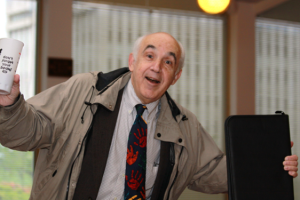
Joel Rosch was a senior research scholar at the Center from 2000 to 2020,where he led collaborations with many of the Center’s government and non-profit partners.
Read on to learn more about Joel’s early work on Family Connects, favorite memories of the Center, and career highlights.
What year did you start working at the Center for Child and Family Policy and how long did you work here?
I began working at the Center in 2000 and worked for 20 amazing years until age and COVID led me to retire completely in 2020.
Could you briefly describe the focus of your work at CCFP?
The focus of my work was to help connect the research we were doing at Duke with government agencies and the general policy process. As someone who has worked both in academia and in government agencies, I had long been frustrated by how difficult it was to get policymakers to use research that could help them achieve their goals. For me, the job I had at the Center was a perfect fit with my skills and interests.
Most of the impact of my work, both at Duke and before coming to Duke, had to do with finding ways to help government agencies work together and with the public to improve public services. Early in my academic career, I became interested in two related concepts: first, the role frontline workers play in all our service delivery systems; and second, the idea that service systems work best when they are co-produced by agencies working cooperatively with citizens and other agencies. At CCFP I was able to use these insights to help inform a number of our successful initiatives.
What’s one of your favorite stories or memories from your years at CCFP?
I guess my favorite memories have to do with how we all felt when we secured funding or received recognition for one of our initiatives.
What are you most proud of from your time at CCFP?
Where to begin…
- Today I’m most proud of the way my colleagues at the Center play a vital role in how research is used when developing and implementing child policy in North Carolina. That is what I was hired to help make happen and it happened. What I saw working on child policy in state government during the 1990s was an almost total lack of research-based policymaking. Today that has changed, and the Center played a key role in that transformation. Ken Dodge hired the right people and created a climate that made it easy for me to help connect my colleagues to the right people so we could get the best information into the policy process.
- I was very proud of my role in putting together our substance abuse prevention center grant. It was a very competitive process and the section I wrote received a really good score. While I had published academic articles and written some small grants, I had never achieved success in the most competitive of academic settings. I felt really good about what I wrote in that grant and how it was received. To me, this was the best evidence of how the culture at CCFP enabled me to thrive and make a real contribution. It gave me the confidence to try to do more.
- This may sound silly, but I felt really good about coming up with the idea of using emergency room visits as one of the variables we used to measure success in what began as the Durham Family Initiative, which later became Durham Connects and then Family Connects. This was a real synthesis of my detailed, from-the-ground-up knowledge of how social services systems actually worked and my academic interest in measurement.
What’s something people might not know about the Center that you would want people to know?
I’m not sure people appreciate how much the Center created a culture that gave people the opportunity to thrive.
How did CCFP change during your time here?
That’s interesting. The projects changed and the personnel changed but the culture of cooperation across multidisciplinary lines never changed.
What’s something people might not know about you?
I’m not sure. I was a sprinter in high school? I’m pretty open about my life and pretty talkative, so most people at CCFP know most of what there is to know about me. I’ve always believed that we are who we appear to be. Odd as it may sound, I do not think there is a “hidden Joel” people do not know.
What’s one way you’ve seen your work impact policy at a local, state, or federal level?
One?
I feel really privileged to have been involved in so many projects that had a real impact on people’s lives, so it’s hard to choose one.
Before I came to Duke, I worked on two career-defining projects.
Working with some talented scientists, I helped North Carolina become one of the first states to participate in and use the FBI CODIS system that enables law enforcement to search DNA databases to help solve sex crimes and many violent crimes.
Later, I was part of a small group that played a key role in getting North Carolina to adopt the graduated driver’s license system which reduced the number of young people who die or are seriously injured in car crashes.
Note that it was always as part of a team, alone very little.
At Duke, I worked with my colleagues on projects to reduce school dropouts, reduce substance abuse, and improve the way child protective services and juvenile justice agencies function. All of these had a real impact.
What is your favorite children’s book and why?
Danny, Champion of the World – it is about resilience and creating an opportunity for efficacy.
Are there any books that you continue to return to and why?
One Hundred Years of Solitude – as I age the book changes and there are new insights.
What’s one of your favorite local restaurants and what is one of your favorite things on the menu?
Pizzeria Toro – any basic pizza, the simpler the better, I’m a purist.
What was your favorite game as a child?
Touch football.
If you had to choose just one, what is a takeaway from your work or research that you would want to share?
The key takeaway for me is that our success came from a culture of teamwork working within a multidisciplinary environment. None of us have all the answers, but together, being open to different kinds of ideas, we can do a lot, and we did.
The 2024-2025 academic year marks the 25th anniversary of the Center for Child and Family Policy (CCFP) at Duke University. In celebrating this significant milestone, we are shining a light on individuals who have been instrumental in shaping the legacy of CCFP. In these 25th Anniversary Spotlights, we’re asking current and former faculty, researchers and staff a series of questions designed to delve into their personal stories and experiences.
by Ella Davis, PPS '25
We live in a world where—in one place—a simple act of parenting, like expectations regarding children’s obligations to their families, could spark outrage and misunderstanding in another. The Parenting Across Cultures (PAC) study, launched in 2008, delves into this complexity, exploring how cultural contexts shape parenting and impact children's psychological and behavioral development across 13 diverse cultures in nine countries.
The motivation for this project stemmed from a lack of previous research on parenting and child development in low- and middle-income countries that have been historically underrepresented in scientific literature, as well as highly publicized media accounts of immigrant parenting incidents considered unacceptable in their country of destination but desirable in their country of origin. There were stories regarding American parents spanking their children in Sweden, where corporal punishment was outlawed. There were also examples of immigrant parents in the United States using healing techniques, such as “cupping,” that were misconstrued as violence. These misconceptions were widespread, so a team of investigators from universities in nine countries worldwide decided to dig into the implications of parenting in different cultural contexts for children as they grow.
Eventually, their study’s goal emerged as one large question:
"How are different forms of parenting related to children's development and adjustment, depending on the broader cultural contexts in which they're implemented?"
Jennifer Lansford, director of the Center of Child and Family Policy and principal investigator of PAC
They began following 1,417 children around the age of 8, annually, choosing the most culturally diverse sample ever assembled, spanning 13 cultures—Jinan and Shanghai, China; Colombia; Naples and Rome, Italy; Jordan; Kenya; Philippines; Sweden; Thailand; and Black, white, and Latino Americans in the United States. Still an ongoing study, researchers gather data on the now-24-year-olds, shifting focus towards young adults’ relationships with parents and major milestones of early adulthood, as they incorporate cultural norms.
The researchers have assessed families through interviews with mothers, fathers, and children about parent-child dynamics, the child’s adjustment, attitudes and beliefs, cultural values, and self-regulation. They also assess adolescents’ reward-seeking, social information processing, and risk-taking via a computerized battery administered at ages 10, 13, 16, and 19.
A key hypothesis addressed in this extensive research is that associations between parents’ behavior and children’s adjustment are affected by whether parents are parenting in a way that is consistent with others in their cultural group.
One example of how this hypothesis has been supported relates to familial obligations. In the United States, white, middle-income children and adolescents do not have high expectations placed on them regarding their obligations to the family. By contrast, in other groups, such as in the Philippines, parents hold higher expectations surrounding their children’s obligations to family, including showing respect and providing care for other family members. Through the PAC study, a child’s adjustment has been found to be worse if their peers have lower familial obligations, but they maintain higher ones. Children would ask,
“Why are my parents doing this, when no one else’s are?”
Another example of PAC’s findings regarding this hypothesis is the global implications of corporal punishment. In 2008, at the start of the study, Kenya, a country included in the analysis, practiced frequent and harsh use of corporal punishment. However, over the past 16 years, researchers found direct correlations between corporal punishment and aggression in children and adolescents. In countries where corporal punishment was culturally viewed as hostile, there was an even stronger correlation between corporal punishment and more child anxiety and aggression. Throughout the course of the PAC project, Kenya outlawed corporal punishment, and PAC findings were cited in the decision that led to Colombia’s outlawing of corporal punishment in 2021.
Although the United States hasn’t moved in the direction that now 66 countries have in outlawing corporal punishment, the Parenting Across Cultures study has played an integral part in the world’s mindset shift surrounding child well-being. Above all else, PAC has expanded research into never-before-seen territories, focusing on understanding the psychological implications of parenting behaviors in diverse cultural contexts around the world. As Lansford states,
"This study adds a perspective from lower- and middle-income countries that have been largely neglected in research literature for a very long time."
As the Parenting Across Cultures study continues, it provides crucial insights into how diverse parenting practices impact child development, in regions that deserve research attention. By examining the effects of these practices, PAC has truly influenced global policies. This essential project highlights the need to respect and understand cultural differences in parenting to protect child well-being worldwide.
Ella Davis is an incoming senior majoring in Public Policy (B.A.) with a Certificate in Documentary Studies. She is interning this summer as a CCFP Research Assistant.
As part of the Center for Child and Family Policy's 25th Anniversary celebration, we are honoring faculty, researchers, and staff who have contributed to the Center's work, culture, and impact.
Barbara Pollock was the associate director for administration at the Center from its founding in 1998 until 2017, and played a key role in the Center's development and growth.
Read on to learn more about her career with the Center, memories of shared service, and favorite children's books.
What year did you start working at the Center for Child and Family Policy and how long did you work here?
I began my role as associate director for administration in December 1998, a week or two before Center Director Ken Dodge moved to Durham. Being part of a startup, particularly one dedicated to children and families, was a perfect fit for me!
In August 2017, I transitioned to a part-time position as a research associate alongside Ken, who had stepped down as Center director. I retired from Duke in December 2018.
Can you briefly describe what the Center was like when you started working here?
We initially operated from temporary space in the Sanford Building while a section of its library was being renovated into suitable offices for our small core team: Ken, a staff assistant, two research scientists, and myself. The staff working on the Durham site of the FAST Track project, which had been ongoing since 1991, joined the Center and were housed in offices above the shops at Erwin Square.
As we secured additional funding for various projects, our team expanded. By fall 1999, we had opened a suite of offices on the second floor of Bay C in the Erwin Square Mill Building.
What were some of your earliest memories of joining the Center?
After seven years at Duke, my new role with the Center was an exciting opportunity to apply my existing skills while also learning new ones. As we were just getting started, I was deeply involved in every aspect of the Center's operations, including finances, grants management, communications, event planning, HR, policy development, and managing our certificate program.
I thrived on the variety of tasks, but I was also grateful when funding from the University and various grants allowed us to bring on additional administrative support.
What parts of your career with the Center make you proudest to look back on?
I am extremely proud of the grants management system and the team I assembled to assist faculty with submitting funding requests and managing awarded grants. Additionally, I collaborated with the Social Science Research Institute to establish their grant office. When the University decided to centralize grant services across Arts and Sciences, SSRI ultimately inherited the Center’s team.
I am also proud of my work in developing systems and procedures for hosting a wide range of Center events, including conferences, lectures, certificate graduation ceremonies, School Research Partnership poster events, staff meetings, and holiday gatherings.
What’s one of your favorite stories or memories from your years at CCFP?
With over 60 employees working on Center projects across three different locations, both on and off campus, I always valued the chance to come together for social events. These included our annual holiday party, baby and wedding showers, and Thanksgiving lunch with our Sanford School colleagues.
We also fostered community through various service opportunities, such as delivering Meals on Wheels, building a Habitat for Humanity house, and cleaning up K-ville after the Duke-Carolina men’s basketball game. Additionally, our team once renovated a reading room at the Families Moving Forward house in downtown Durham, where we painted, made curtains, reupholstered furniture, and collected books.
How did the Center change during your time here?
With strong University support and external funding, we experienced rapid growth. Before long, our yearly grant funding exceeded $7-8 million, and our staff included researchers, database analysts, interviewers, and project coordinators, along with faculty fellows from various departments across the University and the medical center. We established the North Carolina Education Research Data Center, hosted Family Impact Seminars, and developed the Child Policy Research undergraduate certificate. Our events featured notable figures, including a Nobel Prize-winning economist and five U.S. Secretaries of Education, among others. One of our most successful initiatives was Family Connects International, a nurse home visiting program that has since transitioned to a non-profit organization.
What’s one of your favorite local restaurants and what is one of your favorite things on the menu?
Our former Center colleague, Lynda Harrison, and I enjoy lunch at Catrina’s Tequila & Taco Bar in Mebane about 4-5 times a year. Lynda joined the Center as a Staff Assistant and worked closely with Ken and me for many years before retiring from Duke. Now in her early 80s, I am deeply grateful for our enduring friendship!
What was your favorite game as a child?
Baseball. I grew up cheering for the Phillies and often asked my dad to hit balls to me in the backyard when he got home from work. I played first base on my high school softball team.
Can you tell us a bit about your family?
I am the oldest of five sisters, and despite our busy lives, we remain close and continue our weekly Zoom calls, a tradition we started during Covid.
I have two amazing children. My son lives in Charlotte with his wife and their 13-year-old daughter, while my daughter resides in Mebane with her husband and their two children, an 11-year-old son and a 5-year-old daughter.
What is your favorite children’s book and why?
Blueberries for Sal by Robert McCloskey is a favorite book that my mother read to my sisters and me. The beautiful illustrations and suspenseful storyline left a lasting impression. As a pre-teen, I was also an avid fan of the Nancy Drew series, which captivated me with its intriguing mysteries.
What’s something people might not know about the Center that you would want people to know?
The Center is an exceptional place to work, as demonstrated by the fact that many researchers and staff have been with us for over a decade. This enduring commitment speaks volumes, especially considering the nature of our 'soft' funding.
The 2024-2025 academic year marks the 25th anniversary of the Center for Child and Family Policy (CCFP) at Duke University. In celebrating this significant milestone, we are shining a light on individuals who have been instrumental in shaping the legacy of CCFP. In these 25th Anniversary Spotlights, we’re asking current and former faculty, researchers and staff a series of questions designed to delve into their personal stories and experiences.
by Ella Davis, PPS '25
In 1987 and 1988, researchers John Bates (Indiana University), Kenneth Dodge (Duke University), and Gregory Pettit (Auburn University) launched a study with the goal of better understanding children’s behavioral development. Researchers aimed to study young children growing up in various environments because little was known about how children’s experiences impact their behavior, psychological development, academic performance, and peer interactions. They approached parents during kindergarten pre-registration across Nashville, TN, Knoxville, TN, and Bloomington, IN, inviting their children to participate in a new longitudinal study called the Child Development Project. The study would follow 585 children into adulthood -- monitoring their actions, relationships, and attitudes through age 34.
From the start of the project when participants were approximately 5 years old, researchers conducted yearly assessments of participants’ home life, peer interactions, family dynamics, and school experiences. Data was collected annually from ages 5 to 23, and again at 28 and 34. Jennifer Lansford, director of the Center for Child and Family Policy and investigator on the Child Development Project, describes the all-encompassing data collection process:
“We collected information from parents, teachers, peers and romantic partners. We also accessed grades, standardized test scores, and, eventually, reports from their own children.”
With this extensive data, researchers have been able to tests many hypotheses across a wide spectrum of child behavioral development. A major focus of the study was on social information processing how individuals interpret interactions, make decisions, and form attitudes in social settings.
In early studies, Bates, Dodge, and Pettit were able to identify which children were well-liked and which were rejected by their peers, addressing a central question: how do early home and school experiences impact psychological development? They tested the theory that early peer rejection leads to aggressive social information processing, and their findings confirmed this.
Additionally, the Child Development Project revealed that abuse, particularly in the first five years of life, significantly increases the risk of negative outcomes such as arrests, dropping out of high school, and developing depression.
Another area of particular interest to researchers was determining how childhood experiences impact future substance use. A cascade model for substance use emerged from their findings:

Among the most significant insights gleaned from the study, according to Lansford, was the ability to “identify intervention points.” She explains, “Clearly, preventing behavior problems before they develop is better than intervening once they have developed. However, if issues do arise, you can target peer relationships, work with parents to enhance social skills at home, and develop parenting strategies focused on behavioral management.”
The Child Development Project helped identify critical points where child- and family-focused interventions may be more particularly effective. For example, the study’s findings are being used to develop interventions like the renowned PATHS program, which provides easy-to-implement social and emotional wellness curricula for all ages, teaching students how to reframe the social information they encounter.
The Child Development Project laid the groundwork for CCFP’s other longitudinal studies, such as Fast Track and Parenting Across Cultures. It continues to be cited in media and research papers and has even been adapted for international work. Most profoundly, the study has broadened our understanding of child behavioral development and provided the foundation for ongoing innovative work in the field of developmental psychology.
Ella Davis is an incoming senior majoring in Public Policy (B.A.) with a Certificate in Documentary Studies. She is interning this summer as a CCFP Research Assistant.
As part of the Center for Child and Family Policy's 25th Anniversary celebration, we are honoring faculty, researchers, and staff who have contributed to the Center's work, culture, and impact.
Kenneth Dodge, founding and past director of the Center, is the William McDougall Distinguished Professor of Public Policy Studies at the Sanford School of Public Policy.
Read on to learn more about his founding vision for the Center, his research, and the books he keeps returning to.
What inspired you to initially found the Center for Child & Family Policy?
In the 1990s, faculty members across campus who study child development wanted to collaborate to translate their science into public policy. Leading faculty members included Phil Cook, Vonnie McLoyd, John Coie, Helen Ladd, Bob Thompson, and Phil Costanzo. They convinced the university administration to support a new Center. The first step was to hire a Director. I was at Vanderbilt University at the time and leaped at the opportunity to return to Duke in this capacity.
What are you most proud of from the last 25 years?
I am most proud of supporting the career development of dozens of bright young scholars who launched their careers at the Center. They are an outstanding group.
What’s something people might not know about you?
I captained my high school basketball team.
How is being part of the Center unique compared to your experience at other institutions?
I think of two ways. First, the Center has been entrepreneurial in pursuing unusual grants and projects. For example, we started an “evaluation clinic” in which we contracted with foundations to evaluate their intervention programs, thus giving us extensive experience in evaluation methods as well as an opportunity to generate funds to support our research scientists. As another example, we created the North Carolina Education Research Data Center, which houses all the education records of public school children born in the State since 1989, and we contract with researchers to create data sets for them. We have always been in need of stable funding, and the clinic and data center were ways to address that challenge while making a substantive contribution. Second, the Center has tried to be transformational rather than incremental. For example, we took on the goal of discovering how to reduce the population rate of child abuse in communities, not just to have an impact on a small number of participating families but rather the whole population. As another example, we are trying to create a new idea called primary care for families.
What’s one way you’ve seen your research impact policy at a local, state, or federal level?
Sunny Ladd, Clara Muschkin, and I evaluated North Carolina’s signature early childhood education programs, Smart Start and NC Pre-Kindergarten. Using fairly rigorous methods, we showed that state funding for each program led to sizeable gains in student outcomes, including higher standardized test scores and reduced grade retention. We testified to the North Carolina Legislature at a time it was considering possible cutbacks. Our findings made a difference in saving, even expanding, these valuable programs. As another example, we created and tested a universal program called Family Connects to support families. The program is now being implemented in over 40 communities across the nation.
What’s something people might not know about the Center that you would want people to know?
We generate a profit for the university.
If you had to choose just one, what is a takeaway from your research that you would want to share?
Surrounding parents of newborns with social and material support makes them feel less lonely, improves their parenting, and lowers the population rate of child abuse.
What’s one of your favorite stories or memories from your years at CCFP?
Easily the best decision I ever made was to hire Barbara Pollock as the Center’s first administrator. Even before I arrived on campus, I interviewed her from long distance and hired her right away without interviewing anyone else. I just knew what a gem she was.
How has the Center changed during your time here?
The Center has become more integral to the Sanford School. We administer an undergraduate Certificate Program in Child and Family Policy. We sponsor the North Carolina Education Research Data Center, which has been used by our students in over 50 doctoral dissertations.
What is your favorite children’s book?
Tell Me Again About the Night I Was Born.
Are there any books that you continue to return to?
Robert A. Heinlein’s Stranger in a Strange Land and the concept of grok
Paul Prudhomme's Louisiana Kitchen and BBQ shrimp
Thomas Kuhn’s Structure of Scientific Revolutions and the goal I pursue
What do you like to do in your free time?
Attend college sporting events.
What’s one of your favorite local restaurants?
Wooden Nickel in Hillsborough.
What was your favorite game as a child?
Anything with my Dad. We played a game we made up called, “Diver Outers.” My Dad would throw a football just out of my reach, and I would dive as far as I could to try to catch it.
Do you own any pets?
Three cats, three horses, and three mini-donkeys.
The 2024-2025 academic year marks the 25th anniversary of the Center for Child and Family Policy (CCFP) at Duke University. In celebrating this significant milestone, we are shining a light on individuals who have been instrumental in shaping the legacy of CCFP. In these 25th Anniversary Spotlights, we’re asking current and former faculty, researchers and staff a series of questions designed to delve into their personal stories and experiences.

Learn more about Jenneca's work in our CCFP Community Spotlight below.
What were you doing prior to CCFP?
I moved to Durham in 2019 after getting my Masters of Teaching to be near family, and taught high school English and creative writing for three years at Southern School of Energy & Sustainability (mainly 10th grade). After that, I worked at a local nonprofit for a year managing their youth programs and marketing before making my way to CCFP.
What have you spent most of your time on recently? Is there a part of your job you’re particularly excited about?
Recently, a lot of Concur, but I am definitely more excited about the video I have been working on to promote CCFP's Morris Fellowship! I have been working with the current Morris Fellows, as well as Mark Hart and his team, to create a video comprised mainly of testimonials from students and mentors that will showcase the amazing research projects our students are dedicated to, and hopefully inspire more students to apply for the fellowship in the future.
What are you most proud of so far in terms of your work at CCFP?
After being employed by the center for only a few months, our Communications Director, Sarah Brantley, entrusted me with doing a lot of the work to create CCFP's most recent Annual Report. I appreciate the Communications team for trusting me so immediately with creating such a forward-facing product as such a new member of the team and love how the report turned out. Check it out on our website!
What was your first ever job?
My first job was as a summer camp counselor at 4-H Camp in Virginia! I was on the theater team and now have many fun improv games in my back pocket. I worked at various summer camps since then, my favorite being an all-girls trip-based adventure camp in just outside of Asheville, North Carolina, where I lead multi-day hiking and rock climbing trips for girls ages 7-17.
What’s the best advice you’ve ever received?
When I was in graduate school at UVA working on my Masters of Teaching, we were discussing classroom management when our professor told us that when a student says or does something that may be upsetting or hurtful, it's important to remember that it's almost never personal. I found this to be extremely helpful not only in my years of teaching, but actually applicable to most professional relationships in my life—people always have stuff going on that they bring everywhere, and it is almost never about you.
What’s your favorite movie (or movies)?
I have two favorite movies and they are very different. The first is a childhood favorite for which my love has only grown with time: the 2005 animated classic Robots, starring the iconic Robin Williams and Ewan McGregor. The writing is hilarious and the animation is so creative—I notice new details every time I watch it. My other favorite is Booksmart, directed by Olivia Wilde. It's the perfect combination of funny and heartfelt for me.
Do you have any pets?
I have a nine year old beagle named Mr. Allen Rickman, MFA. He loves to sniff all the smells, eat anything he can reach, and attempt to escape the backyard!
Are there any fun facts about yourself you’d be willing to share?
This fun fact is more about my family, but my dad won a U.S. Supreme Court case defending my mom, and it's the reason people are allowed to publicly assemble in front of the U.S. Supreme Court in D.C. It's called U.S. v. Grace!
